Text
Kartodromo Dream
My father and I built the kartodromo together in 1989, said Gianfranco as we looked out across the snaking concrete racing track from the terrace above the now obsolete grandstand.
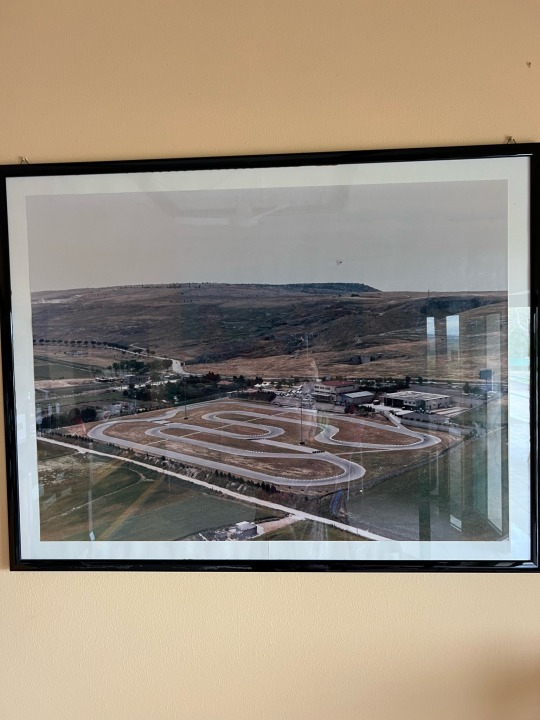
These days, since 2019, Kartodromo, on the outskirts of Matera, in Basilicata, southern Italy, is a camping stopover for motor homes and campervans. You have to navigate the race track, at a slow pace, to find a random spot on the inner two straights. Electricity, if you can get it, is supplied to you from sockets found under a bucket in the soggy grass areas the track encloses. We weren’t so lucky, so had two nights off grid. The facilites are two bathrooms each for men and women, with shower, loo and washing machine. A little old fashioned but the privacy was great.
The terrace bar and the terraced stands would one time have been full of formula 3 racing enthusiasts and their families and fans on race days. Today it is all substance but little content - at least in terms of racing. But Gianfranco fills the space, overshadowing his quiet sister/partner, as knowing temporary residents smile indulgently at us newbies’ bemusement at where we find ourselves this evening.
I was a rich man when I was young, said Gianfranco. I raced all over Europe. I won prizes. Then I made a big mistake. I got married. But what can you do? I love my wife.
Gianfranco is quite a character - a showman who speaks at least four languages and loves to hold forth with his temporary guests.
He’s a great salesman for his town too, and Matera is quite a town or city, I should say. As campers pull in seeking a stopover for a night or two, or have been drawn by its ancient history or more recent movie fame, Gianfranco holds court around a map of the town, with pen and highlighter, he marks out the way to walk, the best places for views of the Sassi, Matera’s historic stone heart, plus the must-see ancient water sistern in the main square, where to get the best gelato and which of the town’s 150 churches, are most worth seeing - especially the ones carved out of rocks.
He tells us we must go up to one of several viewing points above the campsite to see the Sassi at night, lit up like a fairy grotto. He shows us his best photo of the scene at sunset, a flaming sky hovering above a twinkling town as if its lights set the sky ablaze. Gianfranco works out who has transport and who he could ferry up to the best viewing point for eight o’clock that night. He is an enabler. Everything is possible and seemingly no trouble. We don’t buy into the offer as we want to settle into the evening in our own way.
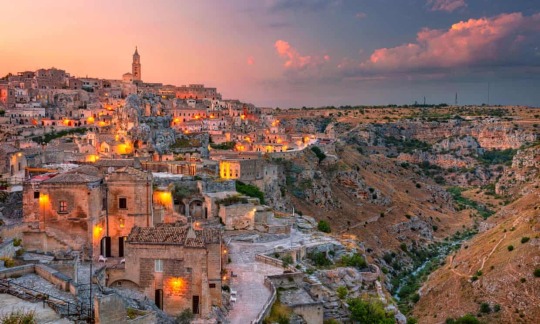
Gianfranco provides a shuttle service for campers four times a day into Matera and back. We opt for the 10am the next day and gather five minutes before as instructed. A German couple and French couple with a bichon friese join us. Gianfranco arrives to drive us, clip board in hand and says, Make a wish, to me. I realise he is referring to a time we would like to return. We opt for 6.30pm. With all he has told us about the town, we think we will be well occupied for eight hours or more.
Return times sorted, Gianfranco directs the French couple plus dog into the back seats of his Fiat Scudo. He opens the front passenger door and offers the Germans in then changes his mind. No, he says, I don’t want to speak German today. Today, we speak English. He indicates the middle row of seats for the Germans and points our way into the front. It’s nice to occasionally be the chosen ones.
On the short journey, he told us a little of the town’s association with the film industry since the 1950s up to now and includes Passolini’s The Passion of the Christ, Mel Gibson’s The Gospel According to St Matthew, and right up to date with the most recent Bond movie - No Time To Die.
Kartodromo, Gianfranco says, was the base for the Bond film crew. He is driving the winding road into town as he reaches into his pocket for his mobile and, one eye on the road, finds a photo of Bond’s silver grey Aston Martin, in fact three of them lined up in a row by the grandstand.
I was their driver, he says, while they were here. A finger in every pie, I thought. The opening sequence of the film is a mad car chase through the narrow streets of the Sassi, typical Bond fare in an untypical setting.
Our first view of this ancient troglodyte city takes my breath away. We had walked down from the shuttle drop off to the large main square where a market of local craft and antiques was happening. We looked for the three arches Gianfranco had drawn on our map like an extended m. You will get your first view of the Sassi from here, he said. I wondered how when we had walked down hill. I had no idea what I was about to see.

There was a small crowd at the balcony under the arches and a busker was singing a contemporary Italian song in its echoey chamber. The crowd moved on and we stepped up to an arch. And there it was - a city within a city built into a vast basin in the rock teetering on the edge of a ravine. We could see a myriad of shiny cobbled lanes falling away below us, and tightly packed and stacked tilted tiled roofs. I could now see how it often substituted for Jerusalem in films. The town climbed up the other side a kilometre away, where a cathedral created its highest point. As my eyes adjusted to its impressive size, I could pick out some of the rock churches and cave dwellings.
The Sassi has a blemished past since the twentieth century. It became one of the most deprived places in Italy by the 1950s. Old black and white photos of large families with haunted faces in one room cave houses, replete with cow or donkey, stare out at us from various points on our perambulations through its lanes. Writer Carlo Levi was exiled here in 1944. Horrified by the poverty and distress of its inhabitants, he wielded his pen and exposed how people were living, writing Christ Stopped at Eboli in 1945. Shamed, the government blustered in and removed the population to new estates and high rises above and beyond - a sad unravelling of a tightly knit community - and the city, inhabited for over 10,000 years was left to the cats and to crumble for a decade and a half.

In the mid 1980s, the government began to give grants to artists and artisans to take over dwellings. A creative community grew and, with further investment, 2nd generation locals returned.
Today, the Sassi is a popular tourist destination with many tightly packed restaurants and hotels, as well as artists studios. There is an evident class divide as you cross from the well heeled south district to the worn down north, where some abandoned houses still gape forlornly at passers by.
What we see is a city carved out of the rock - malleable calcarenite made from sandstone and time-ground fossils - at the edge of a precipitous ravine. As we walk through regular rain showers, I wonder how it all didn’t just wash away, but tufo, as it is more commonly called, for all its sandy texture is as strong as the generations after generations of people who carved out their lives in this rocky cavern.
The Sassi is believed to be the longest inhabited area in Europe, tracing its populations back to pre-historic times. The city’s archeological museum has many artefacts attesting to that from flint spear heads to extraordinarily beautiful Roman ceramics.

It also happens to have some remains of a pre-historic whale, discovered in nearby Lake Giuliano fairly recently. Its gargantuan body washed ashore over a million years ago and was no doubt picked clean by roving carnivores before its skeleton was covered by sand and eventually incarcerated and preserved by layers and layers of sediment hardened to create new land.
We sat and watched a beautifully realised immersive film projected onto two long walls of a darkened gallery, entered by curtain and triggered to run by our arrival. We sat on low seats and were soon submerged in an animated ocean described by a seductive narrative voice, speaking in Italian. English subtitles ran along the bottom of the short wall to our right but we could barely take our eyes off the transformed long wall to read them as we floated in its depths and witnessed the arrival of the giant whale, alive again and swimming right by us, filling the wall screen with its magnificent body, believed to have weighed between 130 and 150 tons. The narrator associated the leviathan with stories we’d know since childhood - Jonah and the Whale, Pinocchio; stories of men swallowed whole and trapped in the belly of a whale; given time to reflect on their mistakes before being belched back onto dry land once more - a second chance to do better this time.

The film ended and we felt a little bereft as we were deposited into the light and the next room - a small space that encased two pieces of the whale - part of its inner ear and a section of skull. The rest of the fossilised remains, including a rib that measures three meters, continue to yield knowledge about the little known Pleistocene era from which it came. Eventually, the Giuliano whale will be displayed in the museum. No doubt suspended in all its one hundred meter skeletal glory, sparking the imaginations of all who see her to write or dream of being swept inside this magnificent creature, and changed forever.
Later, we go into a cave dwelling, dark and organic, itself like the belly of a whale, furnished as it would have been in the early 20th century - a one-roomed home hewn from the stone. Shelved beds for large families each have tufo-carved cats snuggled into wool blankets - some things never change.
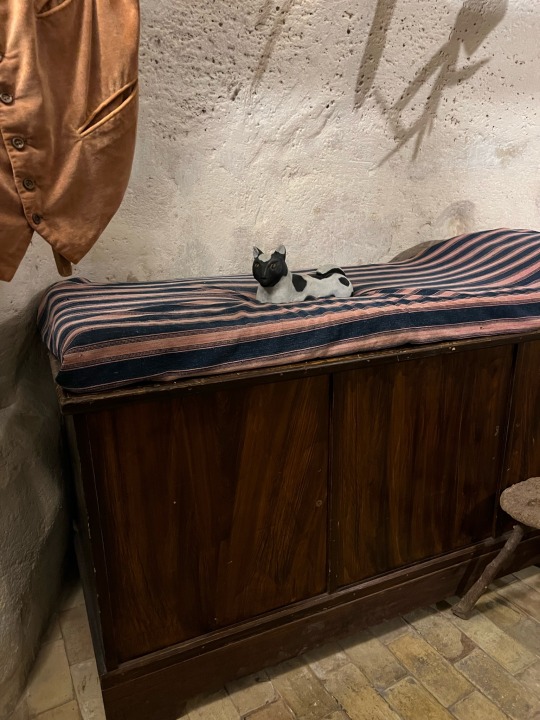
A voice rolls out from speakers a narrative in French, then English, then Italian, guiding our eyes to nooks and crannies displaying pieces of social history as tufo-carved members of the family (husband, wife, grandmother and various representative children) stand or sit silently in naive-style sculpted poses that betoken their roles.
The woman is preparing food for her husband who sits straight backed by the fireplace, presumably to ease a spine bent by a day’s labour. She looks at him as he stares ahead, a perpetual gaze that holds her unspoken thoughts and concerns. While grandmother sits at a loom, a young woman cradles a cloth baby: the oldest and youngest siblings most likely. I imagine childhood only lasted to the age of two or so, back then, before small hands and feet could be directed to useful work for the good of the family. The voice tells us that families were large, often as many as ten children but infant mortality was high. Hence the large families, I thought, to ensure enough children would survive to carry on the line and the endless work of subsisting.
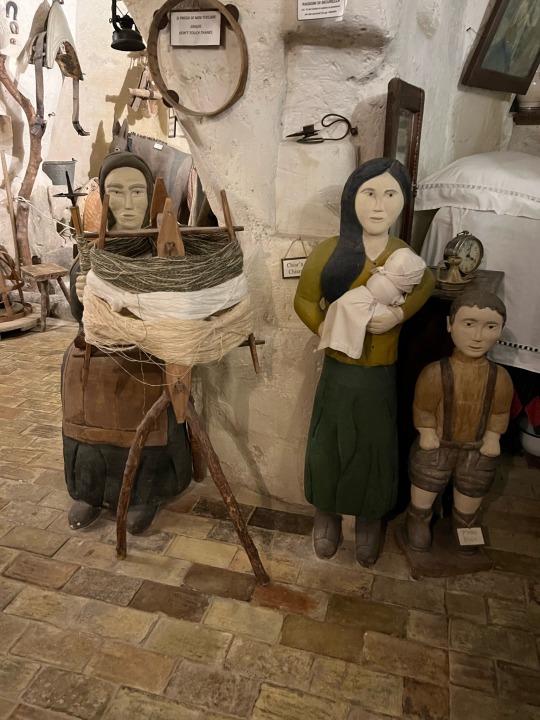
Matera gave us so much that day. We walked all over the Sassi, weaving in and out of its lanes, dropping into an art gallery here, a chapel there or grander church. Stopping for coffee on a terrace to wait out a shower, walking the ravine-side path and leaning on its wall to eat a sandwich, taking in the magnificence of the view, watching walkers across the expanse explore the ancient once inhabited caves on that side, imagining nightly echoey calls across the divide from centuries past with news or requests or threats.

And finally finding Angeli’s for the best gelato in town. I had a thyme and mallow ice cream from its spotless stainless steel containers. Delicious.
Gianfranco appeared the next day as we were striking camp to hit the road for Pompeii. He was on a neat scooter, his glasses perched on his nose as he told us to taste the best cheese in Matera before we left. I looked to where he pointed under the scaffold starters gate, its red, amber, green lights recalling engine roars of impatient racing cars, and saw a small white van, it’s side door open displaying its white cheesy wares.
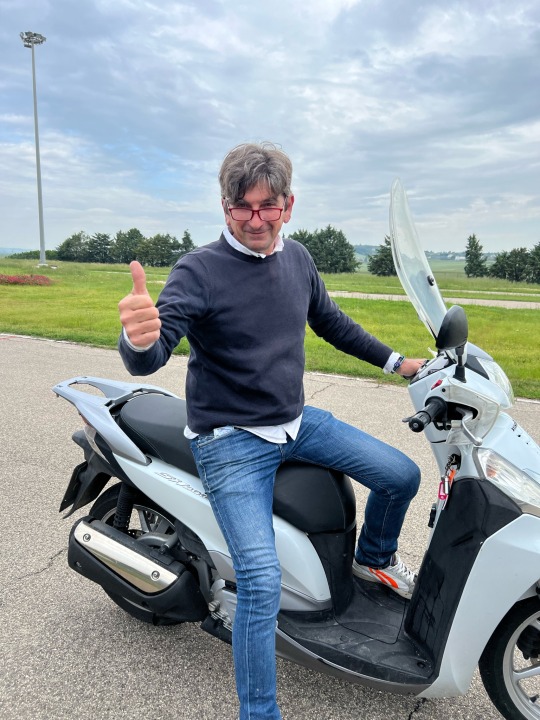
He looked eager, lean; a touch of the boy racer still about him, though he peered over his glasses, in middle-aged fashion. Can I take your picture, I asked? Prego, he said and posed happily, enjoying the limelight one more time.
For so many reasons, Matera is a special place, well worth a visit. But if you get a chance to stay on the Kartodromo site, you will be let into Gianfranco’s dream for a while of racing cars and movie stars and the best of everything Matera has to offer.
Madeleine
(Sassi at night photo by Alamy)
0 notes
Text
Venice Duel and Jewels
The angry, sozzled security guard reached for his gun.
Oh my god! Is he going to shoot the middle aged guy in his trendy slashed jeans - for a crime of fashion, maybe? They had been arguing in Italian. Slashed jeans guy had started it.
It is nearly midnight and we’re on the ferry from San Marco dock in Venice, heading back to Camping Miramare on the Lido. We stepped onto a very quiet ferry and took two empty seats of a set of six.
But they weren’t completely empty. On one of the hard olive green seats sat a black rucksack with a big white NIKE logo across the front. Being well trained TfL travellers, we were immediately concerned. ‘See it. Say it. Sort it’ ran through our minds and Paul went over to the uniformed security guy, who was talking with the ferry crew, to alert him to the bag.
Security guy followed Paul back to our seat, saw the bag and said, It’s mine, in Italian, before sitting down heavily beside it.
We began gesture talking as he asked us where we were from, in English as splintered as our Italian. We shared life story outlines. Showing each other photos of our adult kids - he has a 23 year old lad and is divorced from his wife. He talked in a low, growly slur. He was admiring, if made a little sad by our 35 years together.
Wearying of the effort to make himself understood he put his earphones in and sat back. By now, the ferry had docked at its first stop and was practically full of weary tourists and locals heading home.
Slashed jeans guy was tall and lean. He had swept back ashy blonde hair and a patrician face. He leant back in his seat, his denim clad thighs peeking through the slashes. He was with a tall young man with a wealth of dark curly hair, sitting opposite. Father and son, I thought.
Without moving, slashed jeans guy said something to security guy. Security guy was immediately annoyed, pulling his headphones from his ears. Split jeans guy stayed cool throughout. Confident, arrogant in his middleclassness. The argument went on. Slashed jeans guy was now on his mobile phone as if trying to report what was happening, his manner still languid.
Security guy leapt up, reached down to the gun that was strapped to his leg. Us eavesdropping passengers held our collective breath.
Instead of drawing it, he unstrapped it and threw it into his rucksack. We breathed out. He was now shouting at slashed jeans guy who ignored him as he continued to hold the phone to his ear. His son had a bemused but not overly concerned look in his face as he kept his eyes firmly on his father. Perhaps thinking, Dad’s at it again, but also, needing not to be drawn in by a careless glance in the wrong place.
We took all this in like a police procedural being watched from our sofa, strangely unperturbed by this aggressive and potentially violent if not lethal exchange. The rest of the passengers did the same - some late night entertainment.
We’d just had a wonderful last night of four in Venice. We had visited the Jewish Museum that day and had taken the guided tour around the tight confines of the Ghetto - a square of tall old buildings, some built to eight low-ceilinged floors to house the up to four thousand Jews kept within its confines in the centuries prior to their emancipation in the 1797.
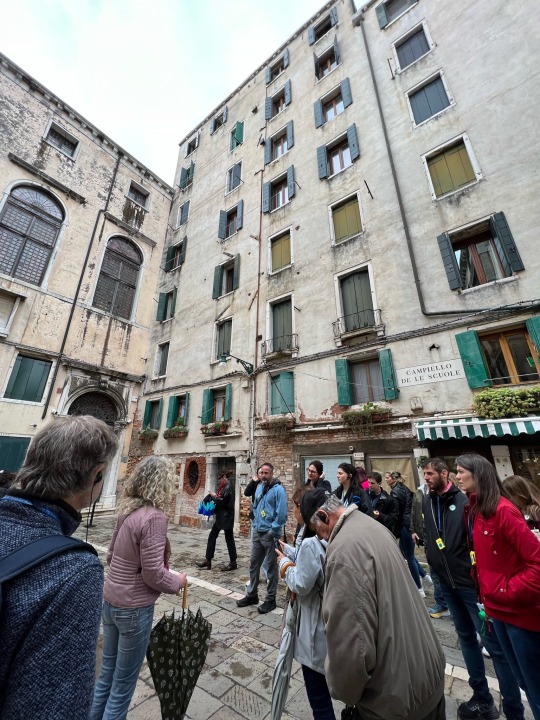
Our guide pointed out three of the unusually tall buildings that had five windows on the third floor rather than the usual four. These were concealed synagogues for the practice and study of their religion, hidden from hostile eyes. This was before the building of two splendid synagogues, jewels of the city, one Levantine and the other Spanish, right there in that tight square, as some in the community became more prosperous despite the restrictions. Incredibly ornate with marble and wood carved by master craftsmen, the synagogues were beautiful but also spoke of rivalry within the Ghetto, as each new wave of Jews from Germany or Spain or the Middle East, claimed their right to be there and made their livings, rising or falling in social status according to their means or wherewithal to succeed.
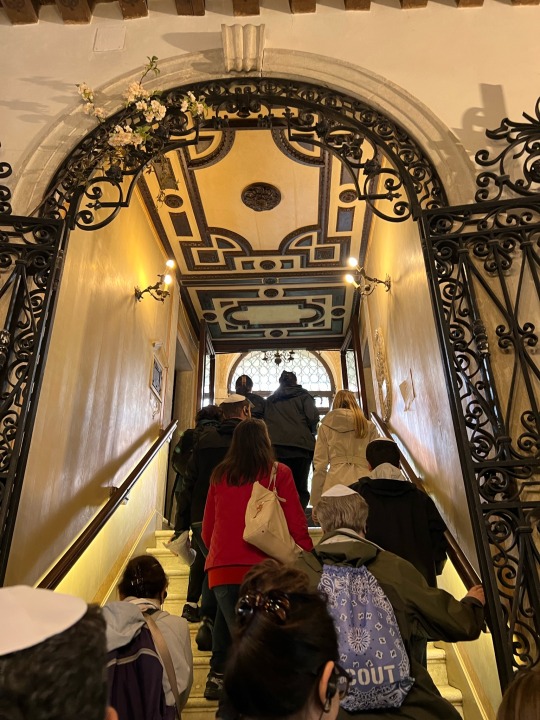
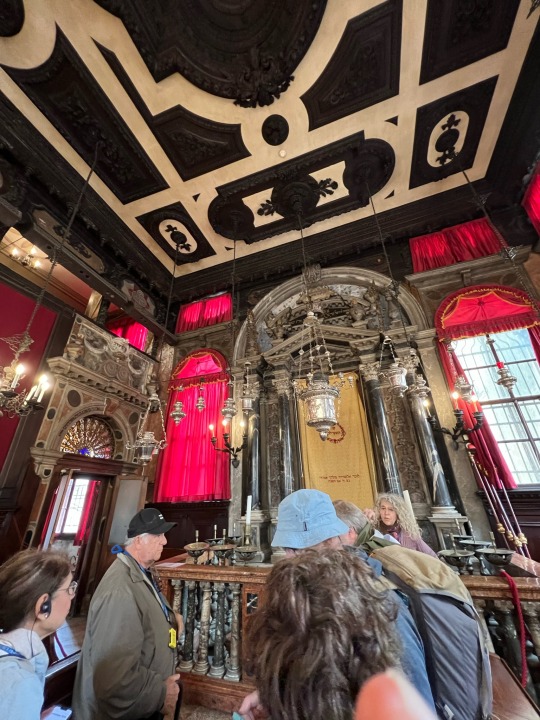

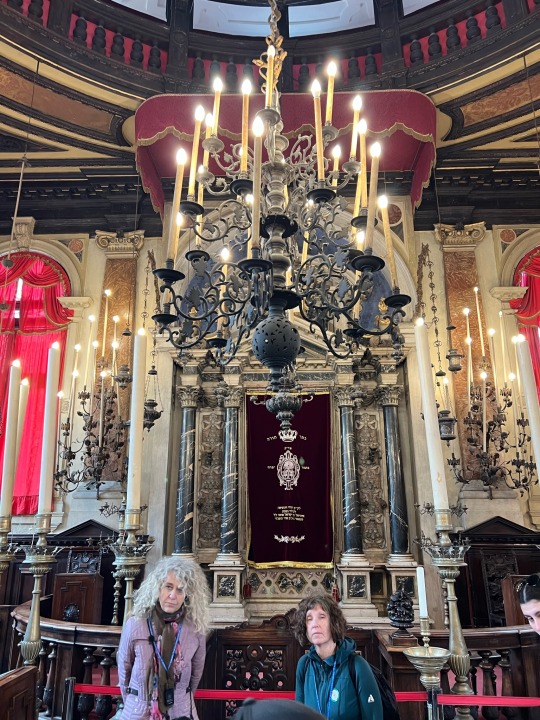


The early inhabitants would be locked into the area by 6pm every night, and allowed out at noon the next day, the men to ply one of the three trades they were allowed to follow: money lending (forbidden to Christians); trading second hand goods; and being doctors. What, no teachers, I asked? The synagogue is a school, our guide explained.
The most moving story was of the nursing home for sick elderly within the community who could not be moved when the WWII pograms arrived and others fled, or lived secret lives dispersed about the city.
Nazi’s came into the Ghetto and dragged elderly, sick women and men from their beds and transported them to a concentration camp where they soon died or were assassinated. Really, what threat did these old people pose that they could not be left to peacefully pass out of life?
Outside the old nursing home building, there are small bronze plaques worked into the cobbles of the square, each one a testament that these people lived and were cruelly taken before their time.
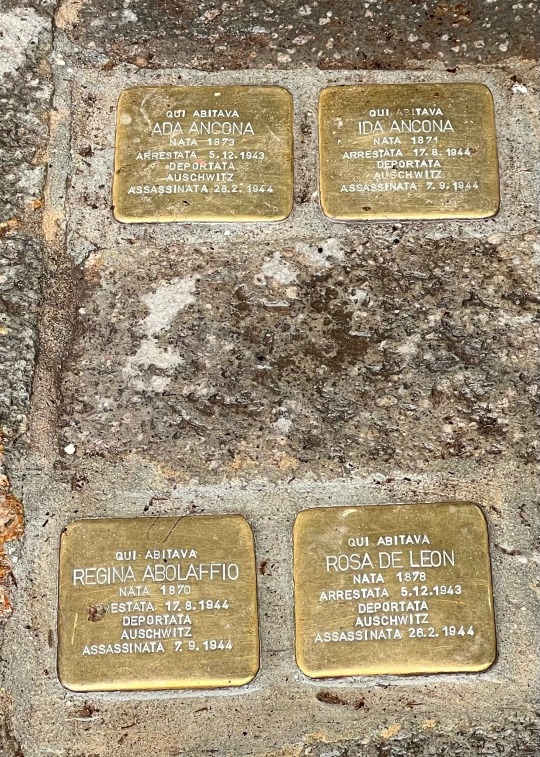
Later that evening we had had a joyful reunion with close friends from London who we coincidentally were overlapping with for an evening on our mutual holidays. How privileged we are to be able to move about so freely and enjoy our lives - something denied to so many, past and present, through no fault of their own.

Security guy had sat back down and phones were our combatants weapons of choice. Slashed jeans guys was still on his phone but not getting through, throwing comments across to security guy in his measured tones. Security guy was audibly more angry in his retorts as he stabbed out the numbers on the mobile. He got through and began to complain loudly about what was occurring. His right hand orchestrating his frustration.
The ferry, meanwhile, chugged and bumped into Punto Sabbioni, our temporary home port. Most people got up to leave, including the duelling pair, phones still to ears as if to put them away would signal surrender.
We shuffled off the ferry and the crowd quickly dispersed. We saw no more of security guy or the other.
Once the argument had begun, they had eyes for no one but each other, like new lovers having a first fight.
What had it all been about? We speculated as we walked the ten minutes back to camp. Slashed jeans guy had taken umbrage that security guy had been drinking either on or off duty but in uniform and armed, and had told him to remove his piece.
Security guy had been outraged to have been addressed and directed in this manner and the argument erupted, but yet he complied, knowing he was in the wrong.
If that was the case, then slashed jeans guy had a valid reason for his challenge, but his peremptory manner spoke more of class patrimony than community spirit and we were left feeling a little sorry for security guy and his lonely state, a ‘ghetto’ of his own making.
Madeleine
3 notes
·
View notes
Text
Water Features
Water features large on a camping trip. You always have one eye on the weather forecast willing it to show fair days, and changing plans if it doesn’t, to outrun the rain.
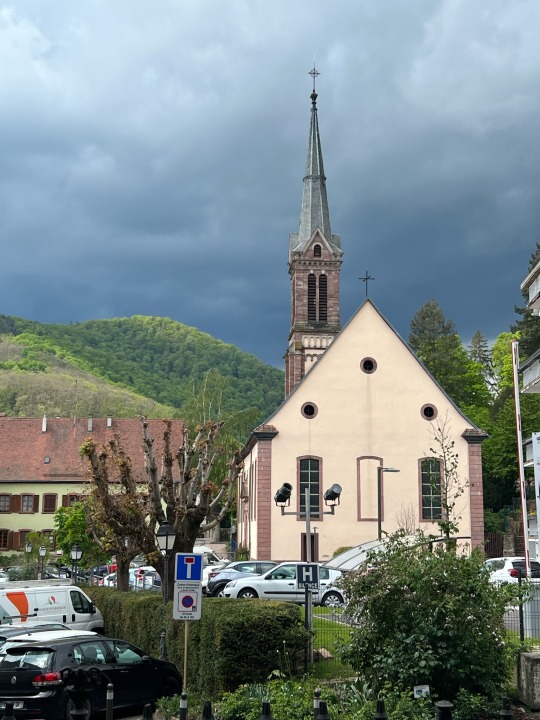
On arrival at a campsite, access to drinking water and the state of the washing facilities is a priority when choosing our spot for the night. The facilities vary enormously from portocabins with no paper, loo seats, soap or hot water to open designed marble and tiled buildings, airy, spacious and clean.
On this six week jaunt through Italy, water has been our fairly constant companion in the form of rain. Beginning in Bolzano in the Southern Tyrol, a week into the trip, we went swimming in the rain in the campsite pool - a cool 24 degrees. As swallows dipped the rippling surface for insects, Paul rescued a a half drowned grasshopper.
The campsite was pretty alternative - a strange mix of hippy values and high prices in its artesian stocked shop and flashy restaurant. But it had a ‘learning loo’ - a spotlessly clean facility with large scape pictures of the Tyrol in every shower. Each loo was totally private and dedicated to a local craft like lacemaking or woodcarving. There were images of the craftsperson at work and the produce and a little display cabinet with a sample of the work. as well as an explanation of the skills in three languages - English, German and ancient Ladin (the regional dialect). As you washed your hands at the row of basins, you could learn different useful phrases in each language on the Perspex panels that divided each one. I learnt a lot in two days by using these facilities.
It rained through the second night and we took down a wet tent the next morning, in the rain. Next stop Venice, four hours away. We drove through the precipitation, reaching Camping Miramare on the Lido five hours later. We set up camp in the rain.
With the tent and ground so wet, we had to erect chairs in the tent and pile them with our bags. The next morning, we looked down from the van door into a pool of water on the groundsheet below.
We finally realised that the big tarpaulin we used as a groundsheet that stretched right under the tent was causing a problem. It was a conduit for the rain. The inside of the tent also had pools of water. It had to go. Once achieved, we could see the breeze already getting to work, lifting the sides of the tent and drying its edges. By the time we returned that evening, the underside of the tent was practically dry.
Despite the rain, we took the ferry from Port Sabbioni to Venice St Mark’s Square on our first day. It was my first time in Venice and the rain could not dampen my excitement at seeing this lagooned labyrinth.
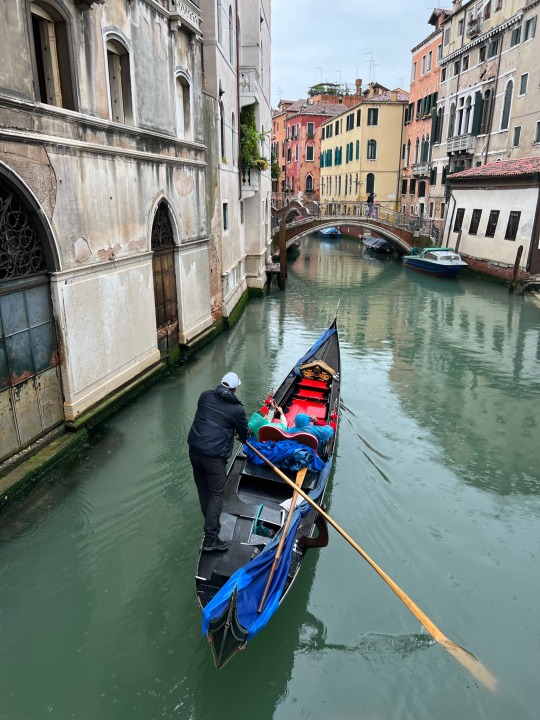
As the ferry approached the dock, we could see how busy it was. Hundreds of people just in that vicinity alone, with umbrellas up and wearing garishly coloured knee length shiny plastic galoshes.
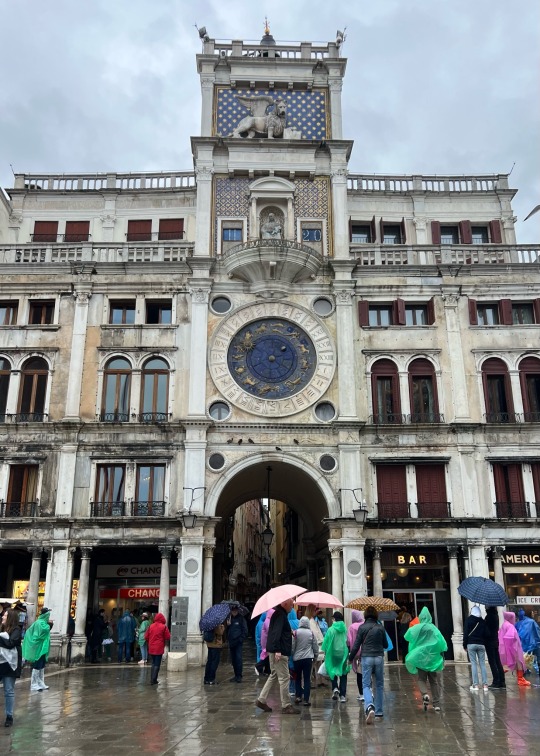
Negotiating the narrow lanes was a challenge as umbrellas clashed and drips splashed down from saturated awnings. Nobody seemed to mind getting soaked. The wonder of Venice is such that it alters your mood. Its water sodden structures have a dissolving beauty. The tangle of lanes befuddle you. The blazing rainbow coloured shop displays of Murano glass dazzle you into oblivious wandering.
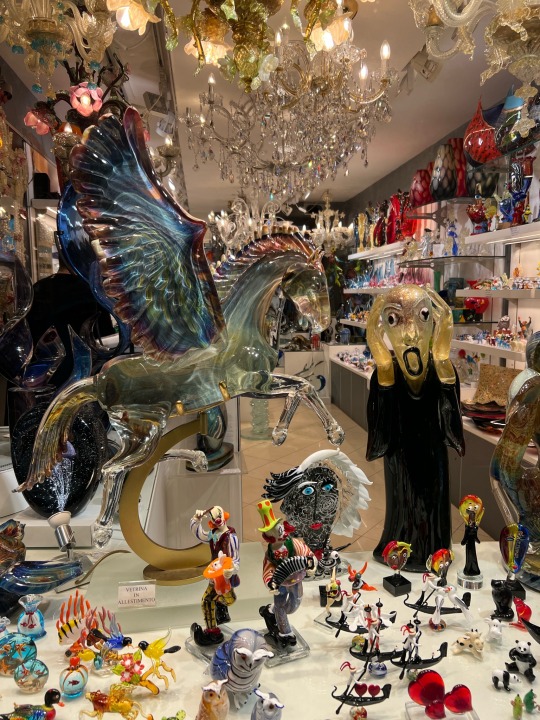
But we craved some space so we lost ourselves deliberately in an attempt to lose the crowds. Taking lefts then rights, crossing many little bridges and traversing small residential courtyards, away from the glitz of tourist tat.
Eventually, the rain penetrated my waterproof jacket; it was that persistent. We found ourselves outside the museum for oriental art, and in we went, heading straight for the cafe that looked out on the Grand Canal. I had my first Venetian Aperol Spritz - it has to be done - and we took a breather from the rain and the bustle.
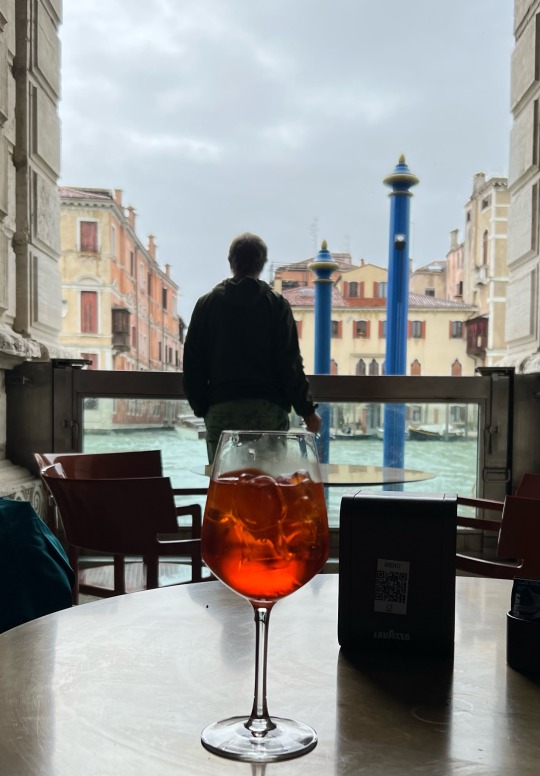
We went on to spend two more, mostly dry, days exploring the quieter islands of Burano with its prettily painted houses and leaning tower; and Murano with its glass blowers - seeing a theatrical display that would have challenged UK health and safety regs for sure.
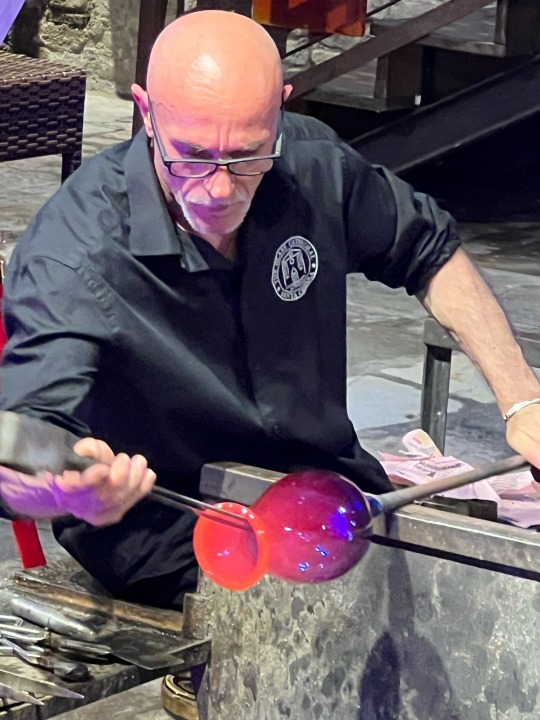
We were going to leave on the fourth day as the weather forecast promised sun and we wanted to take the tent down dry. But we all know forecasts can lie and, sure enough, we woke up to rain. The best thing about that was it meant we could now link up with good friends who were spending a day in Venice before joining a cruise at Ravenna.
It was a joyful meeting on the steps of the train station, all of us talking and hugging at once, excited to be together in one of the world’s most unique and fragile places.
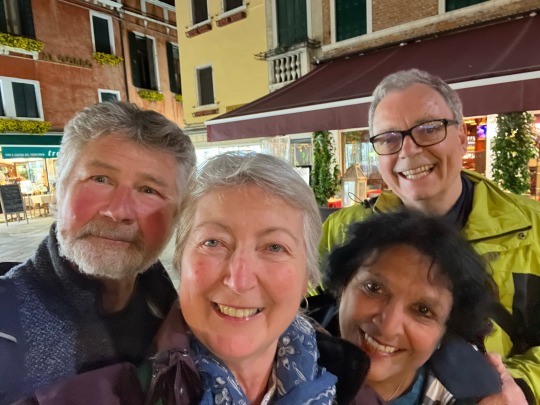
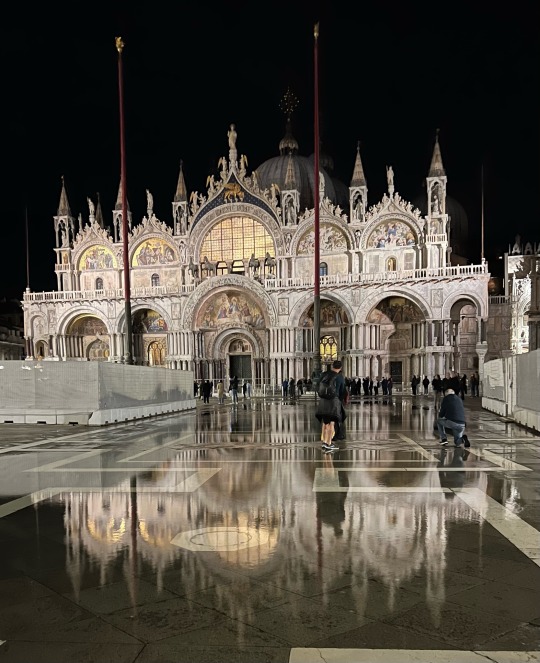
We left the next day, with rain clouds looming and the forecast gloomy, changing our plans to pootle south as we headed for Bari, taking a week and enjoying the coast. Instead we put our foot down and belted south through waves of water attacking the windscreen. In two days, and a night on ‘mad cat woman’s’ dishevelled site, we found ourselves in Giovinazzo on a huge muddy pitch at Camping Baia as thundery clouds gathered to greet us.
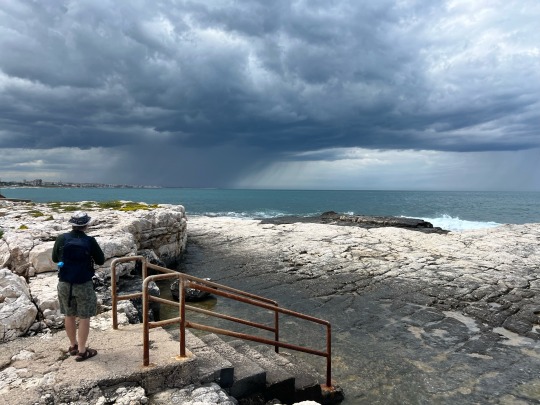
We finally had some decent WiFi and looked up news reports of record-breaking flooding in Northern Italy. We had been receiving concerned messages from family and friends, checking we were ok. It was sad to look at the damage the deluge had done to people’s lives - taking fourteen of them and wreaking homes and businesses as 26 rivers broke their banks and reclaimed the land.
We though about how lucky we were to have had the option of just driving away as far as we could get, carrying our itinerant world with us, narrowly escaping a different fate.
At the half way mark of our six week trip, the sun finally came out when we reached Pompeii - the place where thousands drowned in dust in 79 AD as a wrathful Vesuvius blew its top.
Looking back, my abiding memory of Venice will be seeing it in the rain. It seemed appropriate somehow to be drenched in a sinking city. We had one final adventure on the water as we took the midnight ferry back to the Lido that last night. It involved a sad and slightly sozzled security guard with a gun being goaded by a peremptory passenger. But that’s for another time. Right now, we are soaking up rays in Sorento and the weather is set fair, for a little while at least.
Madeleine
3 notes
·
View notes
Text
The Town that Roofed the World
Blaenau Ffestiniog, the town that roofed the world, raised its hat at our arrival, and grinned with slate grey teeth, then swallowed us whole.
The ghosts of 4,000 miners who never reached their half century live in the faces and limbs of now fewer townsfolk, Welsh speakers all, their heads bent in chat - an invisible force field of a living Celtic language, keeping the ghosts in and us out.
Our hotel window looks at high mounds of rock with slate scree sides that loom over the high street, while modernist slate monuments to its industrial past, present below like appeasements to their wilder overlords.
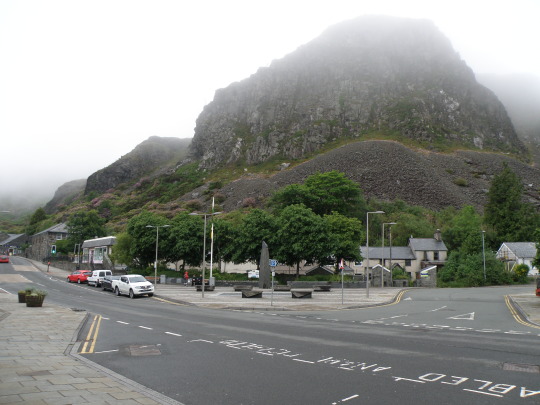
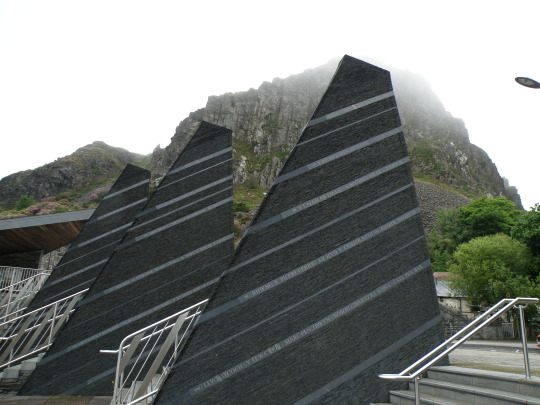
The hotel disdains its current name (Ty Gorsaf - Station Hotel), preferring to go by the more regal Queen’s Hotel - its original nomenclature. When first built, mid nineteenth century, the train station, a hundred yards away, was further up the valley at the quarry, and the new hotel for this then bustling town was named for Queen Victoria. Now station and hotel are uneasy neighbours, bound by name instead of history.
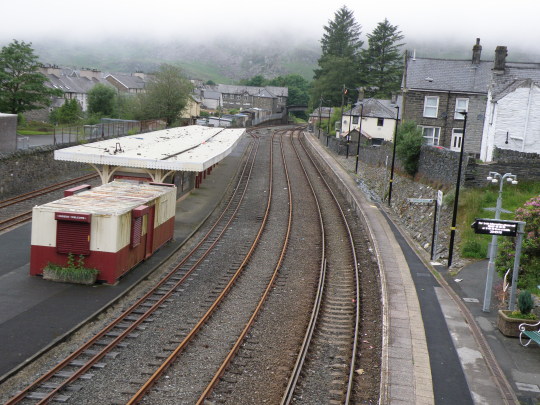
A twilight walk gives Blaenau opportunity to reveal its secret places: lanes that lead to valley views and railway cuts, while a high-hedged park cradles youth playing sport, unseen but heard.
There are two rail lines tracking the town - the Conwy Valley railway line that used to take Blaenau’s slate tiles away to near and far flung places, and now drops off the curious historian or sure-footed walker, or takes away its young, eager for any colour but grey; and a smaller track that wends upwards and into the quarry slopes. This is the famous Ffestiniog Railway; at 200 years old, it is the world's oldest narrow gauge railway. Until recently, a little steam train from Porthmadog bravely chugged visitors up the line into the barren quarry to see the dead about their work between the lines of their guidebooks. It has taken a pandemic to stop the steam train and now it needs a campaign to bring it back.

The hotel ghosts, of which there are several, left us in peace that night. Only late night revellers forgot that outside is not in and voices have wings, waking us at the witching hour with their din.
Morning brought a grey day but good breakfast, sufficient to fuel us for a walk to the local reservoir.
Heading out of town beyond the once thriving market hall, we took a benign footpath up the hill whose lower slopes are skirted green, patterned with yellow iris and sheep in the fern.

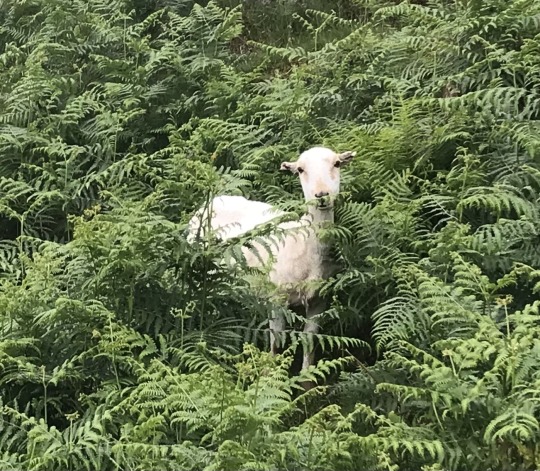
The reservoir lay below the nearby village of Tanygrisiau. We approached from above the houses and segued down its narrow roads of neat cottages either side of the steam train line.

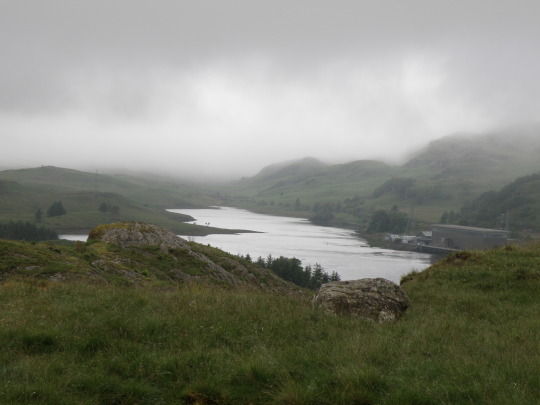
Below, a primary school spilled its small cohort into the yard to whoop and holler to the big sky. My five year old great niece was hidden among them - a little newly-arrived English girl soaking up the Welsh language as it burbled around her, skipping, running and jumping onto her tongue.
Past the school and along the road, we saw a footpath sign and gate enticing us to walk its nature trails around the lake - or so we thought.
Willingly, we entered and followed the path that seemed to lead to where we were going. Up it went, becoming fainter as we climbed. Fewer walkers than normal had been this way because of lockdown, we assumed, and nature had reclaimed the way. Little did we know there was midsummer mischief about leading us on the wrong track.

Soon, what seemed to be a path disappeared and we were high stepping over clumps of long, wet grass hiding dips and delves in the earth.
We found ourselves under electric cables - straight lines to follow that were mirrored on the map - an illusion.
As we slogged on, the ground became more boggy underfoot and I became more anxious. This was not the path.
We turned back and a path appeared heading up the hill and into the woods. It looked friendly so we followed it.
Soon again, the path was gone and we were pushing through pine branches like Lucy on first discovering Narnia. But rather than a magical wintry landscape appearing, we continued to climb and the pine was getting denser.
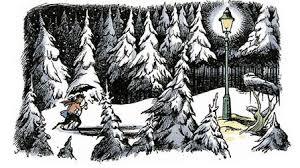
A rocky clearing opened up and offered hope of a view to spot a landmark. But it was a tease as all we could see were trees, undulating in every direction. And every gap leading out of this small open space looked unappealing.
We decided to head down hill in the hope of hitting a proper track or road, or even the reservoir, which we had almost forgotten about, such was our preoccupation with being lost in the belly of the forest. Now we had to crouch as head-height branches were too dense to drive through. Now brambles crisscrossed everywhere, drawing blood where shins and calves were bare. The forest floor became boulders covered in moss. Every step was treacherous and I began to panic, fearing a broken limb or this tortuous escapade lasting for hours.
Paul could see the forest was overwhelming me and I was in danger of succumbing to its grip. He came back and told me to hold onto him. I grasped his rucksack and as we moved slowly on, I drew strength and courage from our connection.
Down we slipped and gripped, now soaking and sprinkled in pine needles like malevolent fairy dust until we came to a cliff. But we could see a road below - a foresters' road but it looked paved with gold to us.
Pine trees were springing up from the cliff, this time not a hindrance but a help, as we clambered backward down the rocks using the branches as ropes.
Reaching the road, it offered up boulders where we could sit, recover, wring out shirts and socks, empty waterlogged boots and pluck pines needles from our crevices and surfaces.
What an adventure! A walk to remember unlike so many others that have long since evaporated. We won’t forget Blaenau Ffestiniog. It made sure of that before spitting us out to wend our way back to the Queen’s Hotel and our cosy bed.
3 notes
·
View notes
Text
Misty Mendip Morning July 1st 2021
The sound of a cockerel in the distance but close enough to wake me up heralded the dawn chorus. This must have been an old bird as he could barely manage a cock a doodle before taking a breath and finishing with a doodle do. Still he persisted and any birds which hadn't woken were surely to do then. And so the din began with blackbirds whistling, finches chirping, sparrows cheeping and pigeons hooting. But loudest of them all was the wren, its voice in indirect proportion to its size. The camper van was a blaze of sound from all directions and my hope of drifting back to sleep in the semi light faded like an evaporating dream.
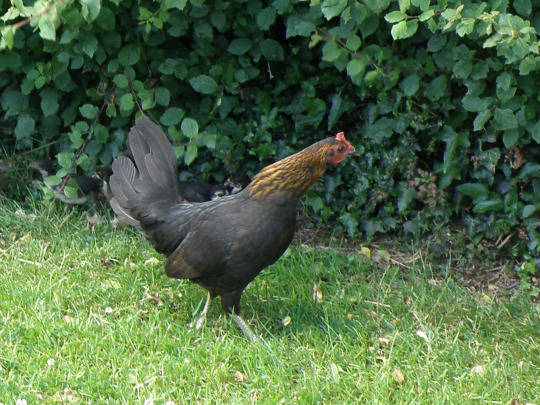
I got up and peeped through the blinds. The field just across the the old drovers road from the campsite which had been full of cattle the previous evening was now empty of cows, gone for milking. The old road which figures on the map as a trusty lane to walk was clogged with nettles, clinging vines and other fast growing greenery and was not negotiable without a stout stick to beat back the vegetation or better still a portable strimmer. There was no going that way on our planned walk for the day. It needed some farmer or council worker to clear a path. In restricted times with less people walking and plenty of early summer rain, plants shoot up to cover the footpaths and trap unwary boots with bracken and bramble. Nettles sting bare legs and skin biting flies land to feed before being slapped to the ground.

Madeleine walking the path with Priddy church in the back ground
A summer mist hung over the Mendips which was to either clear with the rising sun or hang around all day reduced to a haze and reducing too the view that could be had from Ebbor gorge over Wells where we were heading.
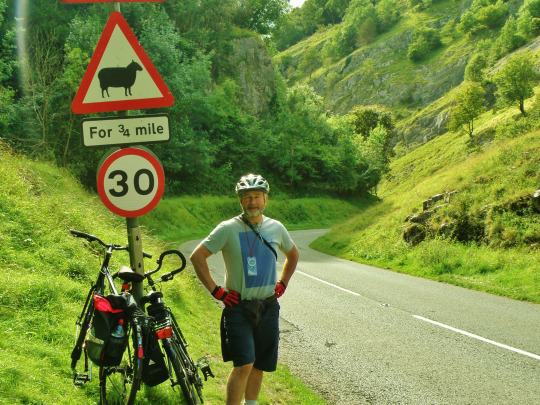
Cheddar Gorge
The campsite we were on sits above Priddy on the road from Wells to Cheddar which spectacularly serpents its way down through the gorge to get to the latter place. We had cycled that road the last time we were there twisting down the gorge past rock climbers and goats perched equally perilously on outcrops, relying on precarious hand and hoof holds; and past walkers and other tourists intent on the tea rooms and nick nack shops that line the gorge road into the town.
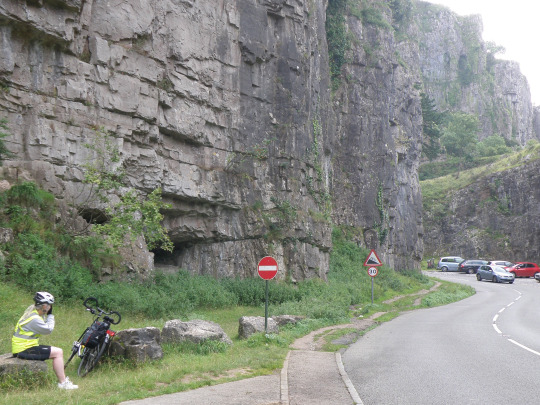
Priddy is a strung out village along that road with a triangular village green, a pub, a church and a school that local children still attend. On our walk past the school we heard them in class singing and chanting a song the teacher had set them. It seemed an eternal sound, something Hardy or Lee might have referenced in their descriptions of Wessex and Cotswolds village life from the nineteenth and early twentieth centuries. The school children seemed to be well provided with a teacher who valued culture. As well as the music, they had produced painted and laminated signs which had been posted round all the approaches to the village welcoming visitors but warning drivers to slow down. Some were more friendly than others with rainbows and polite requests. Others pointed up the dangers to cyclists by speeding drivers with a picture of a cyclist and a car coming from opposite directions and the admonition ' slow down ' with an exclamation mark to which the teacher had added a please. On the way back to the village we saw several of the children cycling slowly home at the end of their school day.

Village sign by local school children
The Mendips provide a relatively flat tract of upland once you are on top, and you can walk several miles with the contours barely undulating through fields which at that time appeared to have been allowed to revert to wild meadow, full of flowers including poppies, buttercups, red campion, dandelions, herb Robert and scabious. And in the walls separating the fields, bright yellow flowers favoured growing on the moss clinging to the stones. It couldn't have been better designed.
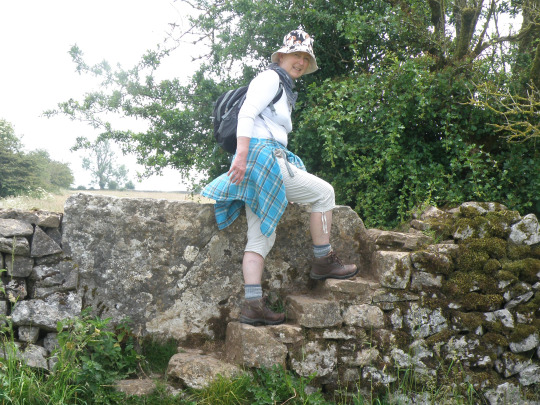
Madeleine climbing a great old Mendip stile
Our route which included parts of the West Mendip Way and Monarchs Way as well as cycle route 3 swung past farms where there appeared to be no activity, though the lanes themselves bustled with big wheeled tractors going about their business. Past fields of grazing sheep separated from us by low electric fencing we finally entered Ebbor wood and a steep decline that would have taken us to the Somerset Levels if we had continued but stopped short at Ebbor gorge and a sheer drop that put an end to the path we were on. Stacks of cliffs jutted up on all sides, coated in trees that mostly obscured the rocks but here and there where the drop was vertical and trees couldn't cling, the rock was exposed and revealed the danger waiting any stumbling pedestrian.
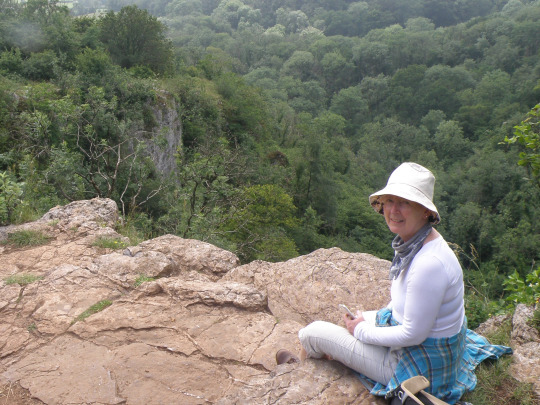
At Ebbor Gorge
We sat and ate our sandwiches, taking in the view blurred by the persistent haze that did indeed linger through the day. Our options were to descend further to the caves and maybe onto Wookey Hole or make a return north choosing a different route. The prospect of having to climb back out of the gorge was too daunting to be tempted by the reward of further visual delights.
So we reversed and found a path that took us back to Priddy and to the campsite where a brew of Darjeeling and a munch of tea cake restored our flagging energy. Almost ironically the cockerel started its crowing, though at that moment the time was nowhere near sunset or dawn on that still hazy midsummer evening.
1 note
·
View note
Text
Camping with Mervin and Joe Moore’s Music
"It took me to go to Ypres and see a Welsh Choir, led by a man from Dover, to hear the original lines to Londonderry Air that referred to the places I knew well and had grown up in, along the River Roe. The words Danny Boy were written later by a Scotch man but the tune was rescued by a woman, Ross, who lived nearby here and heard a fiddler playing it beneath her window." This is a typical ending to story by Mervin, the owner of Hillfoot campsite just outside Dungiven in county Derry, where we stayed for three nights on our journey through Northern Ireland. Mervin himself was not averse to a bit of music as he showed one evening when he switched on an old battered Yamaha keyboard in a bothy he had put aside for campers in foul weather or other, and got a bit of rhythm going to some Irish ballad you had heard variations on a thousand times before.

Mervin is not a conversationalist. He's a raconteur, only mildly interested in others stories and mostly in his own. But I could stand that for a few days as local history is as fascinating as the more famous legends such as the account of the apprentice boys defence of Derry we got to hear again later, when we toured the walls and the City Hall during those few days.
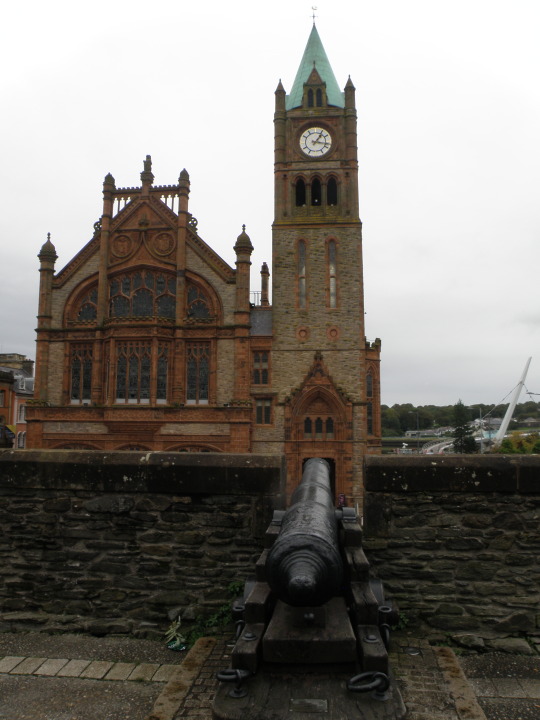
Mervin runs his rickety old campsite under Benbradagh which is part of the Sperrin range of hills. We stood looking up at it the first evening, me thinking I'll take a walk up there tomorrow and him telling me that he had run up it as a lad and asking me how long I thought it had taken. I did a quick calculation as to distance and gradient and said "twenty five minutes anyhow". "Twenty two minutes and thirty eight seconds and I hold the record", he said. I looked again. Even at half an hour that was formidable. And there was Mervin well into his seventies at least, standing tall and a little bent in well ironed belted blue jeans, with shirt bulging over the buckle looking at me with the misty eyes of one with incipient cataracts, taking me back fifty years or more. His gentle voice undulated on the wind, yet his impressive statistics and punch lines needed no boastful emphasis. This man was indeed a charmer. He would say things like "They say round here are you Dungiven? Yes, but I'm but I'm not Duntaken". You got the corn with the barley.

Hillfoot is tucked up a bendy lane off a straight and narrow road the locals belt along at over 60mph. It's almost frightening, especially for cyclists, which we were a few times as we journeyed the couple of miles to Dungiven to get supplies, or catch the bus to Derry one of the days we were there.
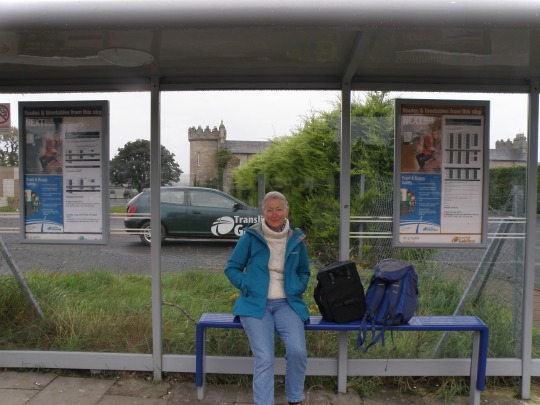
Mervin told us about the vintage car fair to be held in a field beside the Church of Ireland in Dungiven the next day, Saturday. He said the man who had organised it had up and died that week and they had been unsure whether to carry on. But he was going to be there to help, and he told us about Joe Moore a famous but also local country singer, from Dungiven itself, who would be there to do a set.

So we cycled to that and paid our £5, locked the bikes and wandered into a field recently vacated by cows with a high shite quotient, evidenced by the number of saw dust piles scattered around to warn and protect the visitor. The dearth of stalls in the long marquee and paucity of vintage cars didn't promise value for money. And there were a couple of country music players, keyboards and guitar backed by synthed drums and bass, playing to an indifferent audience off the side of a lorry. We had that sinking feeling you get when you've cruised an event like that in five minutes and you're reminded of the Dylan words, '...alright I've had enough what else can you show me'. So we decided to walk the town and come back in time to see Joe Moore, the main attraction.

And there was Mervin policing the gate, humming along to the country singers, doing a song about 'Maggie'. And at the end of every chorus he loomed forward and sang "Maggie" to Madeleine beside me in the kind of suggestive, tomfoolery way you would do as teenagers at a dance.

The town of Dungiven is on the main road from Belfast to Derry and has a busy stream of traffic progressing down its long main street, past its dusty grimy shops and pubs. Just crossing the road is a major deal, as there are no allowances for pedestrians. Yet there's nothing much to cross the road for. So we wandered up and down like Burlington Berty and idled the time in bored window gazing. With not long till Joe came on, we arrived back in time for him to be introduced by a not very funny compère who kept up a patter of mild insults aimed at the people he knew, who provided the scant audience scattered around the field.
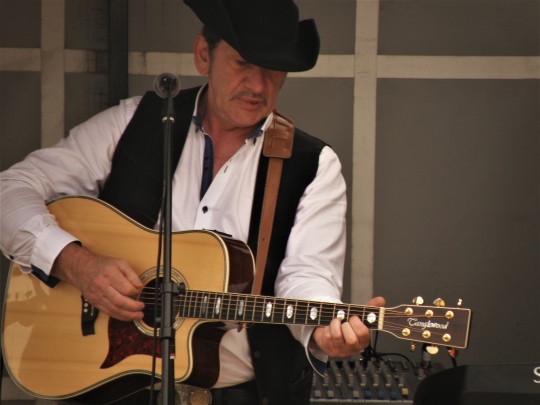
We'd never heard of Joe Moore but we learned a thing or two as his set progressed, as there was a fellow in the crowd who came over at least twice to us boasting of his talent and pull. It made me wonder was he his agent, but he was just excited and pleased to have been born out of the same nest as such a famed celebrity. He said how Joe was one of the most noted country singers in Ireland and that's no mean feat, as country music is as big in Ireland as it is in Nashville, and indeed Joe had been to Nashville. And here he was playing on this makeshift stage with a couple of scratch musicians and without his ubiquitous but trademark cow boy hat.
This man said Joe would be going down to Limerick after his set, where he would play to five thousand people who would pay £35 each for the ticket. I was already feeling I was getting my money's worth as Joe began a set of Waylon Jennings songs and others by Merle Haggard and Johnny Cash and yet others written especially for him, strumming on his Tanglewood guitar and singing in an assured yet off hand way. We were warming him up for his Limerick gig later. And I was warming to him.
Joe has various things going for him along with his honed professionalism. He has a big smile and laughs a lot, back slapping his support that reminded me of Dick Van Dyke in Mary Poppins, a larger than life quality. He had his black cowboy hat which is required for every country singer out of Nashville, only he wasn't wearing it when he came on stage. Somebody kept calling for it, as if he wasn't Joe without his hat on, and Joe said he thought he had forgot to bring it. He must have been going home after for it, before going to Limerick. But no, somebody else produced it from a red Volvo estate and handed it up to him. This Volvo must have been close to thirty years old and I thought it was one of the vintage vehicles on exhibition but it was referred to as the one that was going to drive him down to Limerick. Joe put his hat on and we all sighed in appreciation. He was really getting into gear.

But seriously the best thing about Joe is his voice. He has a smooth rumbling baritone and it sounded like he could get lower than Johnny Cash whom he resembles vocally. I was also reminded of Brett Sparks of The Handsome Family for the effortless way he puts the songs across, none of this strangled, nerve jangling earnestness that also seems a popular way to render a piece of music. So, we got carried away listening to Joe, sitting in our mud sinking chairs in that cow patted field and he gave us his set. What a great local hero. We got our money's worth alright.
Following Joe was an anticlimax, as the elderly woman who put on a karaoke track to sing along to stated before launching into further country music. And we stayed until the first song ended out of respect, as there had been a bit of an exodus after Joe left the stage. We went over to our bikes and cycled back to the camp. Madeleine had work to do and I had a hill to climb. Benbradagh was calling, promising the next encounter.
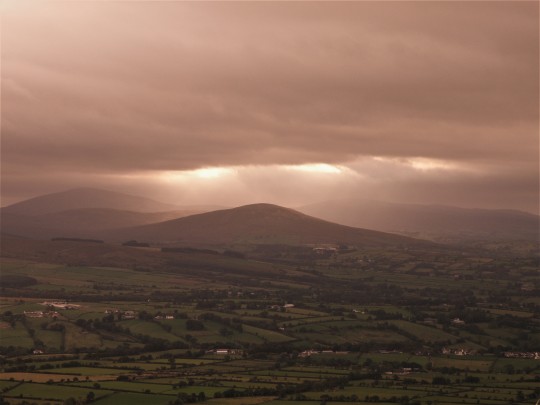
1 note
·
View note
Text
A Bigger Heart
The pigeon tumbled from the sky and landed on Rosie’s garden wall. Waterlogged, hungry and dishevelled, it was a heartbeat looking for a home. There it perched with neither the will to go forward nor the will to go back until Rosie instinctively picked up its fluttering semaphore and spotted it with her benevolent eagle eye.
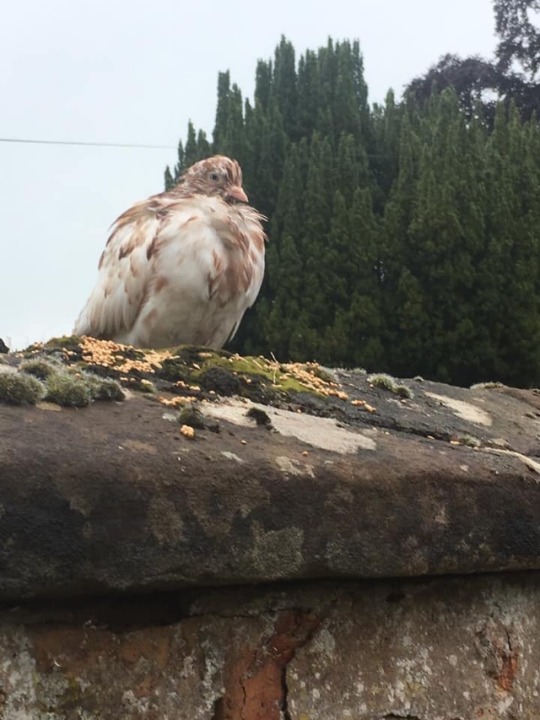
Assessing its distressed condition, she immediately fetched some bird feed and sprinkled it on the wall. Wary at first, eventually the brown speckled bird pecked hungrily at the provision. Rose surmised that it was a youngster and probably hand reared as it showed little fear, allowing her near enough to photograph this poor ruffled specimen.
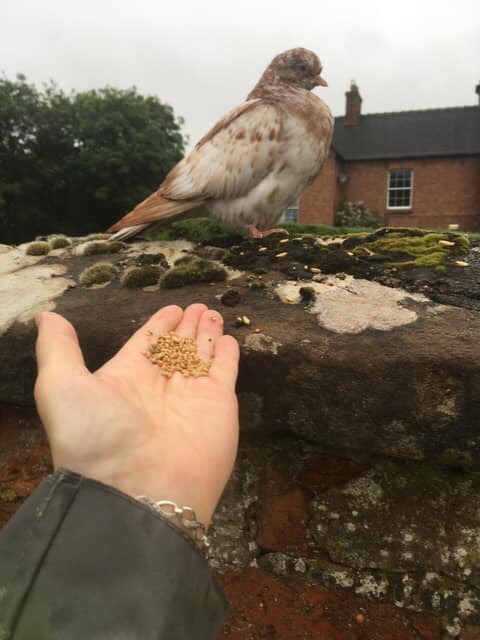
Taking to social media with her snaps, Rosie reached out, as she always does, to know more. Was it a dove? A racing pigeon, perhaps? Anyone missing a bird from their aviary or pigeonnier? What’s the best way to catch it as it clearly needs some respite and is vulnerable to attack in its current state?
Responses swooped in swiftly, including identifying it as a Portuguese Tumbler of unknown origin as not tagged, and a suggestion for humanely capturing the critter. So, armed with a straw-strewn bird cage, more seed, a length of string and a small stick, Rosie set about making her trap to catch a pigeon.
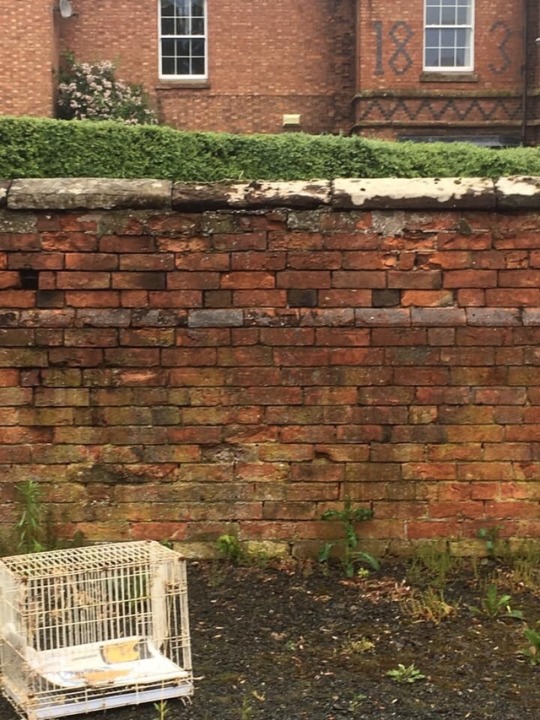
When she went outside, the bird had flown. Well, at least it had had some feed, Rose thought, and turned in for the night hoping for the best for her new feathered friend.
The next morning, when Rosie looked outside, there on the ground was Pigeon, even more vulnerable to attack than before. Rose leapt into action and proceeded to set her trap. She placed the cage a few feet from the bird, propping it open with the stick. The string was tied to the stick and as she unravelled it, she laid a trail of bird feed from the centre of the cage out towards her avian waif and stray.
Retreating with one end of the string in hand, Rosie hid around the corner of the house and watched patiently as the bird took awhile to pick up the trail. But soon enough, Pigeon began pecking his way along the line of seeds and, without further persuasion, hopped into the cage to demolish the small pile at its heart.
Tug! Snap! The stick flicked back, and the bird cage dropped into its base, capturing the unperturbed bird. Talking in reassuring tones, Rosie picked up the cage and entered the house, placing the sanctuary-within-a-sanctuary on a chair in the warmth of the kitchen; safe now from bright-eyed predators of the feathered and feline variety.

Right. Can’t keep Pigeon in a cage and can’t let Pigeon go as s/he clearly isn’t used to the wild. What to do? The endlessly resourceful and indefatigable Rosie decided to transform her summerhouse into a pigeonnier. It only took her six hours (!) to remove all her craft materials and the furniture, knock out several of the Perspex windows and replace them with chicken wire, put up a screen over the door to mask the entrance, and bubble wrap the walls for insulation. She kept a bamboo bookcase to create levels for the lucky bird to explore, supplying nesting material, food and water bowls, and sawdust to scratch around in – all the creature comforts.

The next day, when we arrived at her Shropshire home for a brief and unexpected stopover on our journey home from Skye, we were introduced to Pigeon in its pigeonnier. The bird looked clean, well fed and unflappable as it perched on the top shelf, cooing softly into its fodder. Rosie told us of her plans to knock an apex of wall out in a few weeks to give Pigeon a high perch and an entrance and exit into the outside world, hopefully having gained a new homing instinct and a modicum of sense to know when s/he is well off. Rosie also has plans to find our friend a companion Portuguese Tumbler and has sourced a breeder. She thinks of everything and everyone and I don’t know of anyone with a bigger heart than my big sister.

1 note
·
View note
Text
Loch Seunta
On a cloudfull pressing day we planned to find a landmark not easily uncovered, Loch Seunta. We had got up intending to approach the loch along the sea line. Staffin Bay would not encourage sun bathers or surfers even in the most favourable weather. Boulders dab the shore like turtles laying eggs and sit among dark grey sand, when you can see it. But most of the beach is surfaced by cobbles big enough to step on but unsteady enough to turn you ankle. The beach is difficult to get to in any case with no obvious footpaths across the barbed encircled fields, and being cut off by a stream at one end and crumbling cliffs at the other.
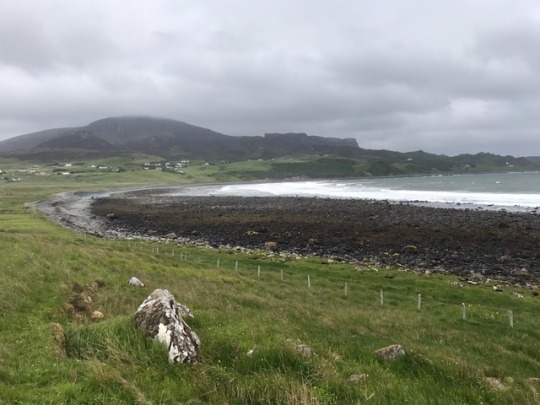
We got to the shore zig zag half expecting some annoyed farmer's shout. The sea was blaring and breaking on the bay, the wind gusting snatches of conversation I could not make sense of, perhaps seized from some headland and brought round for us to hear. We picked and hobbled our way, the only ones on this open wasteland of marine debris, a rotting sheep carcass either dumped or ignored by a careless farmer, fence posts undermined and made horizontal by cutting waves, pointing like pikes in useless defiance in this battle between fields and sea, unable now to keep intruders out or sheep in. Skye is wild and what's been tamed has to continually assert that condition.
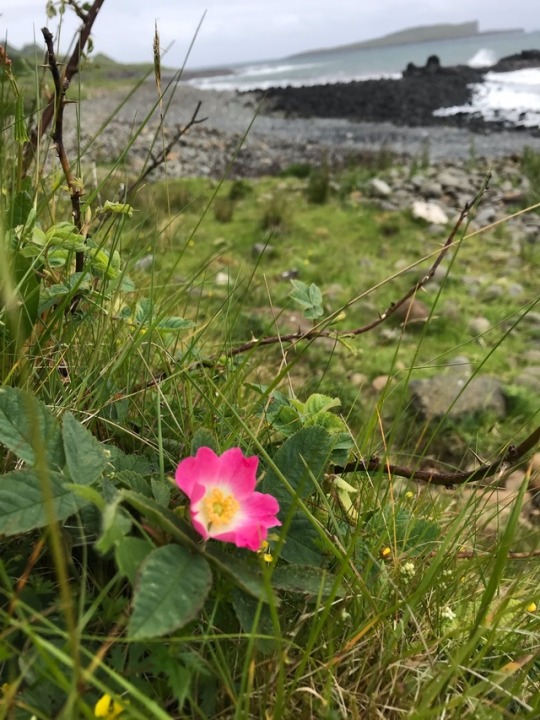
The difficulty of the journey made it feel like a pilgrimage of penance we were making in our efforts to discover Seunta. We gradually compassed the curve of the bay and made towards the headland. The cliff at this point was a slanting field chewed away by high tides. A taunting north wind seemed to be determined the waves would wet our boots before we got away. But defiles in the terrain, beguiling where streams poured off the land so that you could not climb up, still seemed to promise some easier access to higher ground. So it was we discovered a cattle track deeply indented with hoof prints, but drying out sufficiently to not threaten a breach of our footwear. We climbed up the path and after all that, suddenly there it was.
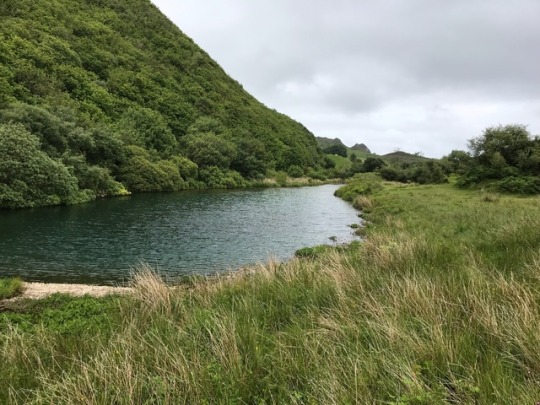
The preparation had made me aware this was a very small loch, the size of a pond really so when we found it at last we thought we had got the proverbial needle. On a 1: 50000 map it is too small to show. If it hadn't been for the helpful young guy in the tourist office in Portree, who drew our attention to it when we said we were booked to camp at Staffin, we might never have sought it out. The internet information explained Seunta means holy and said it was holy for its healing properties. But there are plenty of stretches of water that can claim the same. Indeed there is one famous holy loch called Holy Loch. So there you are. Still, other descriptions intrigued. It's a stones throw from the beach, and while the salty sea crashes away at the dark rocks in its foamy dark intensity, grinding them to pebbles and finally to dust, ever determined to get to the root of the earth, on the other side of a hillock this small stretch of water moves quietly rippleless, transparent so you can see the bottom that gives it an inviting clarity, lightness and purity. Seunta is fed by a spring that keeps it the same temperature winter or summer, perhaps at 7 degrees. If I had come across it in my mid twenties I would have stripped my kit and leapt in to yahoos and other less than reverential bawling. However, today was cold and overcast and I was content to take a hand dip and caress my face, hoping I would become more handsome. But the trivial nature of my desire ensured the healing process refused to accommodate my whim. Still, the time spent at Seunta felt precious.
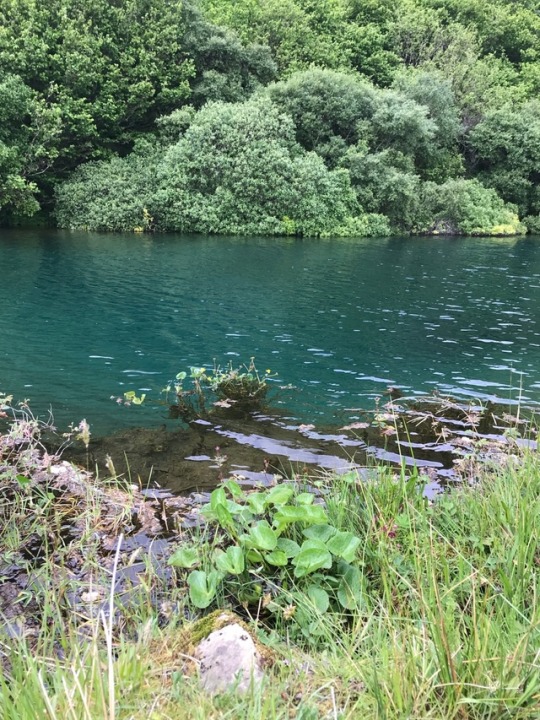
The water is blue unlike the peaty troubling invisibility of other lochs and as it fills from the spring one end it slowly empties along a steam at the other sinking under the hill and emerging over the pebbles and down the beach to join the sea. So just as Seunta departs itself, we left it, walking up the hill on a track made by cows that winds like a fluttering flag up to the road. As we arrived at the tarmac we could see a gate out of the field to a small car park where there were no vehicles. Strange in this island inundated with visitors. On the other side of the gate was a sign warning 'Beware of the bull and cows with calves in the field', enough to put off half the population and probably intended to do that. Also this car park did not advertise itself as such. There were no signs anywhere to orient the traveller. And so it is that virtually everyone passes by ignorant of the experience waiting for them below.
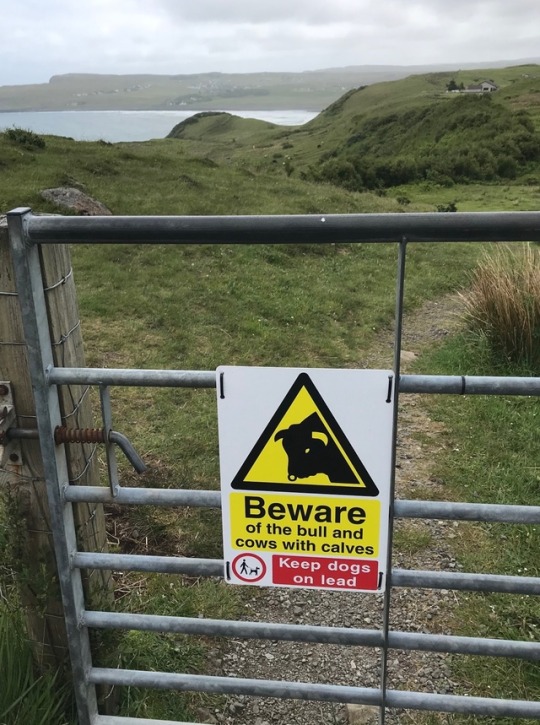
I felt almost holy and I felt almost blessed when we came to see, finally, Loch Seunta. Maybe it was the foretelling of its ancient reputation and the preparation I had undergone. I had had a similar but more intense feeling years before on Crete in a coach on its journey up to the Sevaria gorge. That time it seemed god had spoken to me but certainly a strong feeling of being a part of the oneness of things played over my molecules and left me slightly amazed. I had then made a walk over several hours down the gorge to the sea in the company of other coach users. This time there was nobody with us, just us two. And the sense that this was an attraction that had not cut through to the consciousness of the ever increasing other tourists who travel the roads of Skye, made a very private event of it all.
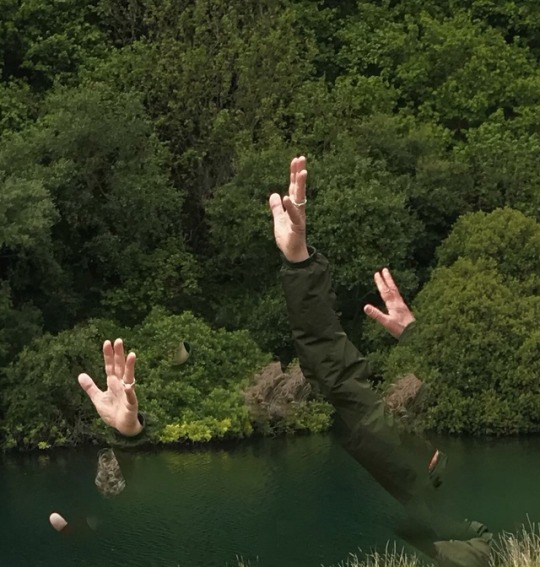
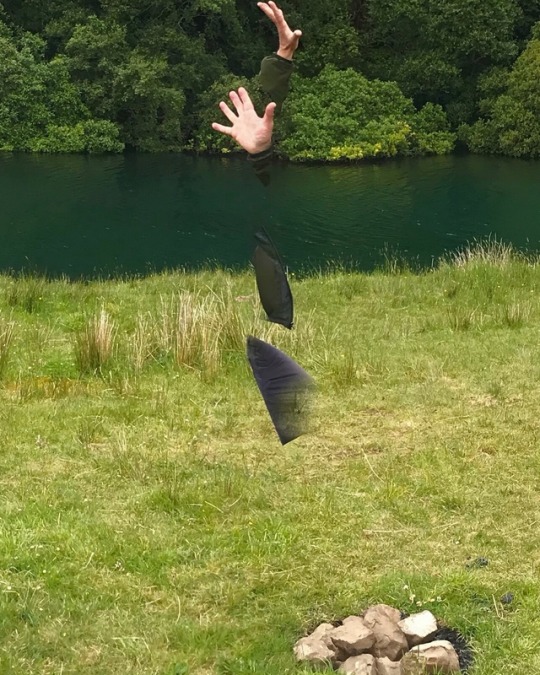
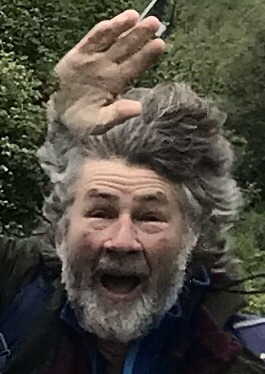
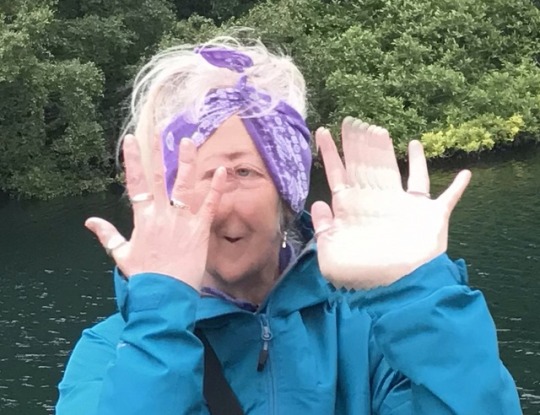
1 note
·
View note
Text
The Magician’s Assistant
As we rolled into our Fort William campsite, thunder rumbled like ancient cannon fire, a memory of battles fought around this garrison town. Rain spat at us without insult: a warning benediction, as it turned out.
As we erected the side tent to our campervan, dark clouds bullied above us. You stabbed the earth with a metal tent peg as a flash of lightning lit your efforts. Not the best implement to be wielding with lightning around, you said, but no more came.
Sitting in the van thirty minutes later, with the rain now gone, we drank our tea and shut our door against the next onslaught: midgie hordes threatening to invade us.
The sudden noise of a helicopter interrupted our chat and the evening birdsong, slicing through our tranquility with unkind cuts.
I couldn’t see it. It was just a noise bouncing off the mountains and the earth. It landed eventually, close but behind trees that bounded the campsite playfield and picnic ground. I glimpsed its flashing lights and blades through dense summer leaves on heavy branches.
Curious campers looked out of van doors or lifted tent flaps. Some wandered down to the playfield for a closer look. Your first thoughts were of a mountain rescue; mine were of a celebrity arrival. But conditions were not good for flying, so this was unlikely to be a whimsical jaunt.
Shortly after, the blades mowed the air again and the machine rose to meet the mountain’s shroud and disappeared into the mist.
Peace restored, I began to prepare our evening meal, a veggie hotpot, and instantly forgot about the interruption.
Whrryll, whrryll, whrryll. Fifteen minutes later, there is was again. Really? What’s going on? Hope this doesn’t keep up all evening, I thought, being reminded of police helicopters pursuing puny criminals from the air over our Hounslow borough home, late into the night, on occasion.
Finally, it growled into the air again and swooped away, allowing the quiet evening sounds to return: tentative birds, clinking cutlery and sliding camper van doors, opening and shutting, to release their captives.
It was two days later, in a newsagents, as we waited to board a boat to Skye, and I casually read bored headlines about politicians behaving badly, that I saw the picture of a woman. She was about my age, dressed in hiking gear and smiling, relaxed and happy, sitting on a rocky outcrop, the top of a mountain, perhaps. The headline ran: Woman killed by lightning strike in freak accident while walking in the Highlands. A closer read revealed that she was in the Ben Nevis mountain range above our campsite and the accident happened around the time of our arrival.
Two rolls of thunder and a flash of lightning is all it took. Like a magician god showing off a terrible trick, it was over in a flash and nobody saw death appear and take her place. It was a sobering thought, how near we were to a fatal accident; how we had flirted with the brief storm as we blithely carried on setting up camp. And the randomness with which it was her and not one of her walking companions or one of us on the campsite who was picked to be the magician’s assistant that day. Was it luck? Fate? Chaos? Whatever you call it, it was on our side that day, and we were travelling on to Skye: a little chastened and very thankful.
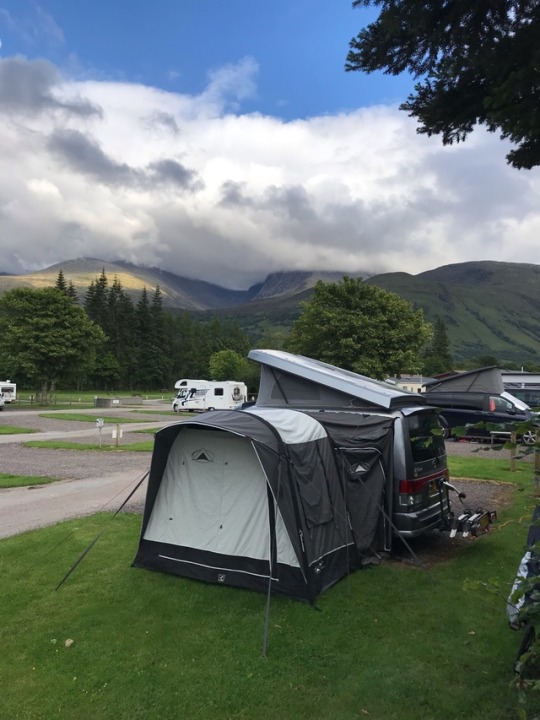
0 notes
Text
Bathroom Talk
Bathroom Talk
The first thing I want to know on arrival at a campsite is not where will we pitch or what will it cost or who will our neighbours be; it’s what are the bathroom facilities like.
Having stayed in twenty-four different campsites on our two month trip, we have learnt that standards vary widely from the downright dirty to the practically palatial, with the environmentally friendly amongst them. Decent sanitary facilities can make or break your enjoyment of a camping experience.
As a minimum, I’m looking for cleanliness, hot water and a toilet seat (!). Extras would be toilet paper and hand wash. We always went prepared, just in case. Having stayed in several places that lacked the minimum requirements and some that were in poor condition with broken wash basins, missing shower hooks or heads, and poorly designed shower cubicles where your dry clothes end up soaked - you know who you are - we know what we are looking for to ensure our comfort.
The award for best campsite bathroom facilities 2018 goes to (drum roll) Caravaning Oyambre Cantabria, near Comillas on the Costa Verde.
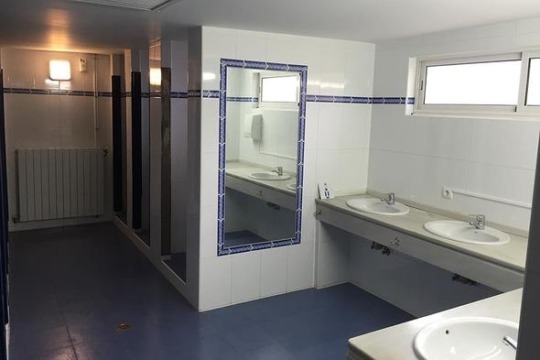
As soon as I walked into you, I knew we were in a good place. From walking across a large terraced area where all the facilities are, including laundry and dish washing, your clean sweep spoke of high standards of hygiene and orderliness. Walking into the ladies, I was struck by the abundance of gleaming marble wash stands. There were plenty of toilets - replete with seats and individual toilet rolls rather than having to take a few sheets from a shared wall mounted drum.
There was an abundance of showers that had working hooks and a good amount of space - not least a sheltered bench and hooks upon which to place your things and be confident they will stay dry while you shower.
There were nice touches like scent sticks in jars of essential oils.
Most considerate of all was the area with two individual bathrooms reserved for parents to bathe small children. This was a first. I thought about the many times I have been using the facilities on other sites to the accompaniment of wailing toddlers, slippery in parents’ arms. Miserable for all concerned. Here were bathrooms provided to make the task of keeping children clean easier, more pleasurable and less hazardous. Comillas - I salute you!
A worthy mention goes to the sanitary facilities at Sesimbra. You may have been basic - no toilet seat or hot water in hand-basins - but you provided us with a place to shelter from the storm as Hurricane Leslie was threatening to hurl itself at us with 112mph winds. Your sturdy stone walls were part of our evacuation plan (no pun intended) if things got rough in the van. Luckily, Leslie swerved west before it hit our south facing shore and we didn’t have to put the plan into action. But you were there and that was a comfort.
The big finger goes to the campsite we almost made the mistake of staying in at Viana do Compostela when we were looking for the Orbitur site - a very good campsite company that runs 29 sites in Portugal.
This campsite is 300m from the Orbitur and we mistook it in our eagerness to get pitched after a long day’s drive. Set amongst a expanse of tall pine trees, the site is vast and has many permanently situated caravans and family-sized tents with extended canvas walls and wooden patios over sandy pitches. All well and good but the place was like a ghost town, deserted summer dwellings gloomy and grumbly in the shade as an unsecured flap slapped unhappily and cats waited lazily for their nightly hunt to begin.
We found the space at the far end of the site for campers. It was as desolate as the rest, only a pair of cyclist in a hill near the facilities were pitching tents.
I did not have a good feeling about this and said let’s check out the loos before we set up camp. Up we went only to be affronted by the crummiest, most neglected and worn out bathrooms to date. That sealed it for me. Let’s not stay, I said. I don’t
Like this place. I knew there must be other campsites nearby in this seaside town. Sure enough, having made our escape, we saw the missed Orbitur sign at the end of the road and turned into a well managed and cared for place, where there were happy campers, well fed cats and decent loos. We ended up staying a week. You cannot underestimate the importance of investing in salutary sanitaires.
0 notes
Text
I Dreamed I Met Bob Dylan
1 I dreamed I met Bob Dylan on the local train through Kew
I was relaxed and homeward bound out of Waterloo
going up to Isleworth looking at the view
seeing what was different, watching what was new
2 The guard was checking tickets he asked me for mine
I handed him a library card he said now that’s just fine
but you should know the rules and have you read the sign
It says library cards not valid as payment on this line
3 It reminded me I had some books I needed to take back
before I got a library fine cos the money I did lack
There was travels on the road by young Jack Kerouac
and Le Pere Goriot by Honore de Balzac
4 We passed some playing fields where schoolboys practised cricket
and the guard kept on insisting I pay for my ticket
he said he'd throw me off the train into a thorny thicket
I answered back and told him exactly where to stick it
5 Things were getting difficult and I didn’t know what to do
when someone yelled Dylan’s on the train and he wants to talk to you
He said just keep it short man it’s not an interview
and I ran between the carriages thinking there's a queue
6 But when I got there I could see that Bob was on his own
His hair windswept and curly he didn’t have a comb
He was wearing a black bowler hat and his suit was roughly sown
I was thinking is this man for real or is he just a clone
7 He turned to me and flashed a smile his eyes were crinkly green
like lights to go and never stop he just surveyed the scene
He looked at me said pray tell me the places you have been
I couldn’t say just up to town to buy a pair of jeans
8 So I told him that I loved him and his music it is rare
How brave and true his lyrics are there’s nothing he won’t dare
How he questions all authority spurns those who say beware
And with all that loving flattery Bob paid my railway fare.
9 Bob asked me would I start the show when he next went out on tour.
He was going off to Germany down the Rhine and to the Ruhr
But before I signed the contract the guard he made damned sure
to kick me off the train at Barnes and I ended in a sewer.
10 I watched that train disappear into the bright sunset
music floating back to me I felt a deep regret
and loneliness beset me for the man I had just met
But Bobby's voice came through the air and told me not to fret.
11. I sat beside that rail track wondering what was doin
and the cattle in the nearby fields started up a mooin'
If ever I saw that guard again I swore that I would sue him
for the pain he caused and the damage done
as my new blue jeans were ruined.
12 I woke up in a drenching sweat and a pounding in my brain
And the echoes of a thousand songs trying to ease my pain
Each one a Dylan classic and as I hummed each blest refrain
I wondered would I get the chance to ride that train again.

1 note
·
View note
Text
The Swiss Shower Man
The Swiss shower man
I imagined him coming out of his massive motorhome in his elegant dressing gown with braid at the wrists and perhaps epaulettes. Madeleine said she had seen him leaving his van the previous morning in his ankle length robe and swinging his toiletry bag purposefully, making his way to the communal facilities on our campsite at Sesimbra, just south of Lisbon.
This morning I had got up quite early about 08.00 and by 08.05 I was having an enjoyable hot shower to start the day, the only person in the whole of the toiletry block as everyone else was still abed. This was October and campsites generally were deserted, so there was no mad rush of expelling bodies wanting to get to the toilets or elbow each other for the sinks, as you get in August anywhere.
Except the Swiss man who was emerging from his two storey six wheeler that had the incredibly wide TV screen you could catch him and his wife watching through the aquarium sized back window, that had no curtains, signifying a wishes to show off or at least display, their home from home. We have a Mazda Bongo with a side awning tent to get about in. We love it and it's been a very reliable during our six week travelling through France, Spain and now Portugal. But it doesn't have a shower. Yet the big Swiss waggon did, though your man chose to use the facilities.
Now it's important to say that although there were perhaps eight shower cubicles, only two were plumbed for hot water. The rest had single taps. I know Portugal gets hot, over 40 degrees in some places this year. But not now. So hot showers are the order of the day. I had sussed where they were at the end of the row of cubicles and had chosen mine with good ventilation, shower head, lock on door and hook to hang my gear, all of which are essential to check on campsites as they are often missing or broken.
I heard another body come into the block as I was soaping my grateful torso. It was your man in his dressing gown. I didn't know that then, and vaguely registered the toilet being used. As I was drying myself I heard a loud and peremptory voice declare in English without any introduction or pre amble "You need to get out of there now. I want a shower. You have been in there half an hour. Come out", in a German accent. I kid you not. I was amazed and froze at first and then incensed as he continued with his berating tone. I replied there is another hot shower you know. Use that. He said, "no there isn't" in an absolutely confident refutation. I said yes there is check it out. He went away for a few seconds and I continued getting dressed. Then again: "You really must come out if there now". I was appalled and well pissed off and determined to give this guy a talking to when I got out.
I didn't wind him up by slowing my progress and came out of my cubicle to see him standing, door half closed, in another. His hair was neatly parted. He had on his glasses and looked perfectly manicured before his shower. He had a mild mannered look which beguiled his earlier tone and looked like he would come off badly in a pillow fight. I said you know you're not too old to learn some manners and not talk to people like that. His response was defiant. "I needed to use the shower and you were there a long time, half an hour". Again his tone was managerial rather than confrontational but no less peremptory for that.
I thought is this how you go about the world, confident in your own superiority that you cannot see the irony of your present position. Maybe he got exactly what he wanted with that way. But he had no authority here. The memory of work situations where incompetent supervisors and managers who had incomplete knowledge of what they said but used their positions of authority to insist on their way, was very present with me. I said I was in there ten minutes pal and in any case there's another hot shower. He persisted with his denial of this till I pointed it out and then he said "I didn't know" as if it remained my responsibility that he had been kept waiting. Do you see what I mean by this totally self assured incompetence so evident in those dressed in a little brief authority. I said well you know now. Anyway it's no excuse for bad manners. He just didn't get it. He continued asserting his case that I was the one in the wrong so I walked off showing him the back of my hand in a whatever way.
Whether all this had anything to do with his leaving he went that morning, his big assed van belching diesel at 11 miles to the gallon. He never came back.
Addendum. The dream that might have happened.
That night I had a dream. In it I was having a shower and really enjoying the hot steam of it, soaping and singing. Suddenly there was a voice right outside the door demanding I get out, a peremptory Swiss German accent. I said to the voice I'll be out in a minute just let me dry. The voice said no you will come out now and what sounded like a hacking began to occur against the poor door which was made of flimsy material, and a knife blade appeared through it on my side. I was shocked to say the least. I opened the door which is not a good idea in real life but what you tend to do in dreams.
I was confronted by a giant six foot Swiss Army knife with all its blades out, twirling its corkscrew in my direction, its tin opener and bottle opener threateningly, its thing for getting stones out of horses hooves making a sideways motion to try to distract me, it's screwdrivers all pointing at me as if I was a screw.
"You have to get out ", said the Swiss Army knife. "I need the shower now". I was bemused but funnily enough not scared. What's going on I said. The knife replied, "I used to belong to a Boy Scout from Ormskirk but I escaped from him at an international boy scout symposium in Lisbon last week and I've been wandering the area since. He treated me terribly. He never cleaned me. He used to pick his toe nails with this blade, showing the main knife blade. He picked his nose with this, the corkscrew. God knows how he didn't lose his brain. Leave the shower now, so I can get myself nice and clean again". I was beginning to get the picture. Ok I said standing aside for the Swiss Army knife, giving it my towel and wash bag. "And while you're waiting for these back", said the Swiss Army knife, "be a good chap and put me on some coffee".
I know my place.
0 notes
Text
What’s In A Name?
Have you heard about the hurricane? asked the young Portuguese man as we approached the entrance of the campsite. We had just walked up the steep hill from Sesimbra port after our day exploring the town’s impressive hill top castle and pleasing seaside resort, and we were still puffing a bit - or at least I was.
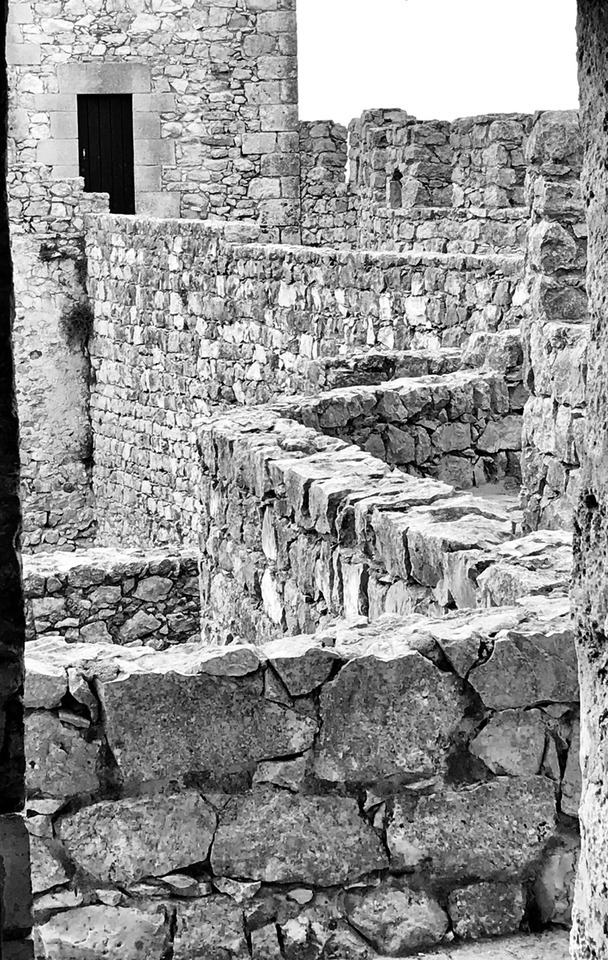

No, we said in unison.
Hurricane Leslie is heading right here. Portugal is on red alert, said his girlfriend.
What, all of it? I thought. This must be a whopper.
The two were standing next to packed-up rucksacks and looked as if they were waiting for a lift.
We are not staying. The campsite manager told us we might not be safe in our tent with the strong winds, she said.
Up to a hundred and twelve miles an hour, he added.They were both wide-eyed and as eager to give us the news as to get off the campsite.
The young man was working his fingers over his phone as he explained, I’m trying to get us a room in town for the night.
We’re in a campervan, you said, so we should be alright.
I wasn’t so sure. The word hurricane unnerved me. There had been several recent weather events that had hit the headlines, including flash floods in Mallorca, the woman blown off a cliff top into the sea in her caravan in Galway and
Hurricane Michael in Florida. We both knew the destructive power of the weather and that it should not be underestimated.
But Hurricane Leslie? Would it be so powerful? The name made me think of Leslie Philips, of Carry On fame, and I couldn’t quite take it seriously as a name for a ravenous hurricane. He always seemed quite hapless, in those ludicrously letchy comedies of their day, always distracted from a task in hand by some gorgeous and unattainable woman passing by, and uttering his catchphrase, ‘Ding dong!’ to signal his desire.

Thanks for letting us know and good luck finding a room, you said to the young couple, and we walked up the the terrace bar for a drink, mulling over what we had just heard.
All was calm and quiet in the bar, apart from the ubiquitous tv giving weather reports we could not understand; but the night was drawing in fast and the wind was making the corrugated plastic roof and sides of the outside seating area flex with a nerve-jangling noise that made me and the campsite cats jumpy.
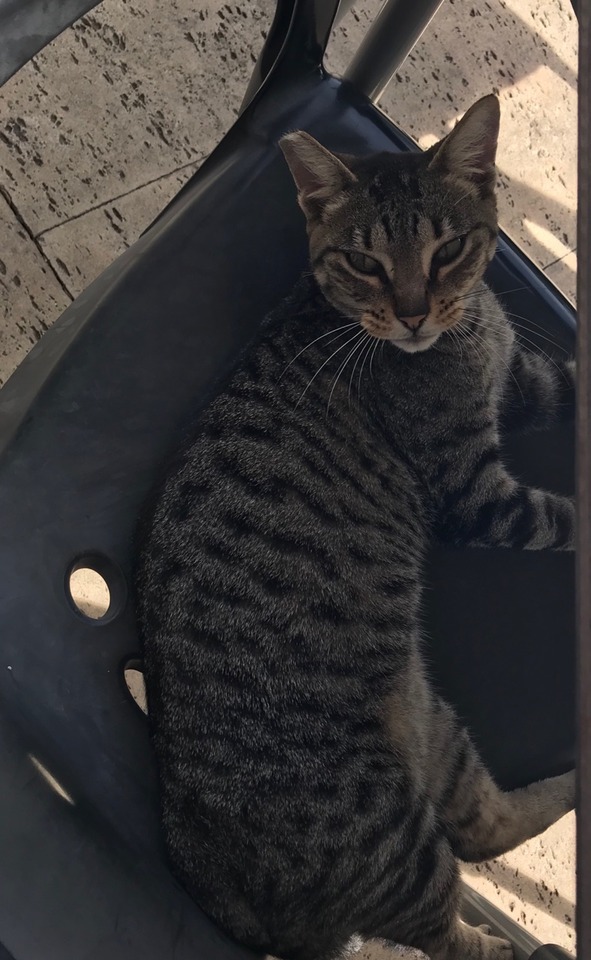
What do you think? I asked. Should we come off the site for the night too and try and get a room in town?
I don’t think we need to do that, you said. We’ll pull the pop-up roof down and secure the side tent as much as we can. We’ll be fine. The terrace we’re on is not at the very top and it has some shelter.
What if it gets really bad in the night and we have to get out? I said in my worse-case-scenario voice.
We’ll go to the toilet block, you said calmly. That’s made of stone and not going anywhere. We can sit out the night there. Rodin’s thinker came to mind but I dismissed it as a frivolous thought. I did not relish the idea of a night in the loos but saw the sense of it if absolutely necessary.
I went down to the campsite office to see if they had any advice to impart to the campers who were staying. The woman in the office looked at a loss when I asked her. I’ve only been here since June, she said. And this has never happened before. It’s an historic event to have a hurricane hit Portugal. If you don’t feel safe up on the pitches, you are welcome to come down lower or go off the site as you wish.
Will you leave anything open down here for shelter, I asked her, in case of an emergency?
No, she said. I’m locking up at eleven and going home. Good luck, she said.
Obrigada, I responded, not really feeling it.
We didn’t have a second drink in case we needed to have our wits about us later on. We ascended to our cliff-edge terrace with a view of the sea (in daylight) and you gathered large rocks to weigh down the tent as the ground was too hard for our tent pegs.
As you cooked and I tried to read my book (Angela Carter’s The Magic Toyshop, a dark tale of what a maelstrom growing up can be) the winds became stronger and the Bongo was buffeted from side to side.
You lowered the roof a little so the wind was not hitting taut sides.
I could feel adrenaline running through me but I was not really afraid, more excited at the thought of experiencing a hurricane. I had a sort of ‘bring it on’ attitude that I was pleased with. It reminded me of putting on a big show at school - not feeling it was ready and opening night descending fast. ‘Feel the fear and do it anyway’ is always my mantra for myself and others, and it was standing me in good stead in this circumstance too.
We ate and enjoyed the meal you cooked and shared a bottle of wine - the need to relax out-weighting concerns about having our wits in tact.
We cleared up quickly, made the bed up and pulled the roof fully down. It felt odd but comforting to have this tighter space about us, as if the Bongo’s metal sides were our armour against this marauding foe.
We had to leave our steel keep to use the facilities before settling down. I grasped your arm as we left the relative security of the campervan. We were immediately bullied by strong winds that seemed to surround us, howling taunts, snatching at our clothes and hair, pushing and pulling us as we struggled along the fifty meter stretch to the toilet block.
Once inside the white stone building, the winds relented momentarily but I could hear them prowling around and slipping under doors and through gaps in this airy space.
Our ablutions completed, we made our way back. No one else in the sparsely used site was about. Our nearest neighbour, a large motor home, was in darkness at the far end of the terrace. Its occupants, a Dutch couple, invisibly waiting to see what the night would bring.
We clambered into our narrow bed and hunkered down under the duvet, brought down the electric screens over the windows and you pressed the central locking fob. The satisfyingly heavy clunk of all the door locks falling into place in unison made me feel secure, as it had every night of our eight week journey. Come what may, we were well defended like the occupants of Sesimbra castelo long ago. Though our battlements were moulded steel on rubber wheels, we felt safe.
Surprisingly, we both fell asleep quickly and slept well. I woke around 3am when the hurricane should have been at its worst to find all was quiet. It seems Leslie had skirted over us and swerved north before landing thirty miles away above Lisbon, maybe distracted by a better looking piece of coastline.
The next morning we woke up to a beautiful day. I was so glad we had not wasted time and energy worrying about something that, although we had no control over, we had faced off by putting up our defences and were ready for whatever challenge it threw down.
This was a hurricane that had never really had firm intentions. It had been wandering lazily around the Atlantic before it spotted the Portuguese coast, and like a leery lothario, it came on to claim a conquest. It was not to be us, thankfully. It seemed as if Leslie had proved to be all bluster and no balls but we learned later that it had brought down many trees and took power out of thousands of homes but there were no fatalities that night.

Then, in the coming days, as if infuriated by being downgraded to a tropical storm, Leslie rampaged across Spain and into southern France’s Aude region where it caused flash flooding that took ten lives.
Hurricane Leslie, despite its innocuous name, proved to be deadly after all.
0 notes
Text
After a Portuguese Poet
There was so much unquitted longing in those days
In the eyeing and sighing
among the low and high brow
But now we live in the times of fulfilment
When you can have what you want
That makes us lost in what we have
And creates a new wave of longing.
For what? A task or someone.
Desire melts the body
But longing excites the soul
And yearning is not soothed
By all the things we have
Maybe we just have to do or make something
and feel it with our hands
And look at it and see what it is
Then give it to someone
As if it has nothing to do with us
And watch their pleasure
As they see and smell and feel and touch and listen
To this thing and as
They whisper back.
0 notes
Text
The Barking Dogs of Portugal
Barking Portuguese dogs on lonely hills and down discarded alleyways
Getting no response they keep on barking.
What is it with Portuguese barking dogs?
I have heard them after dark and in the morning.
On each occasion one solitary dog keeps up a similar bark that gets no louder or more insistent.
But after every sequence seems to wait for a response that never comes.
And their owners never call them in or seem to be distracted by their noise.
As in that communication I hear no message meant for me so I soon tire of the sound and wish it would end.
But this does not happen and in the non stop yapping I begin to feel some projected sense of loneliness and to feel lonely myself and wish I could bark back,
as if to say it's ok I heave heard you and I know what you mean.
Once many years ago I was in Portugal cycle touring with a friend.
And exhausted from the day we found a place to sleep, in some pousada in a quiet little place, that no one goes to and where the dust settles on your hat when you do not move or even when you do.
The owner addressed our needs in an offhand way and showed us to an indifferent room where we wearily laid down our panniers and stretched into a welcome horizon.
As the sun dipped below an Algarve outline and blacked out all detail of sight, a flourish of sound commenced from a barking dog that was so close it seemed it was in our heads.
All through the night this dog barked, moving on the roof above and we slept never a wink.
The next morning we spoke of this to the owner, who laughed and said the roof above our room was flat and where he kenneled the dog, which must have smelled us out as strangers.
We were young and we accepted his explanation when we should have refused his bill and left him with enough escudos to buy a muzzle for the dog.
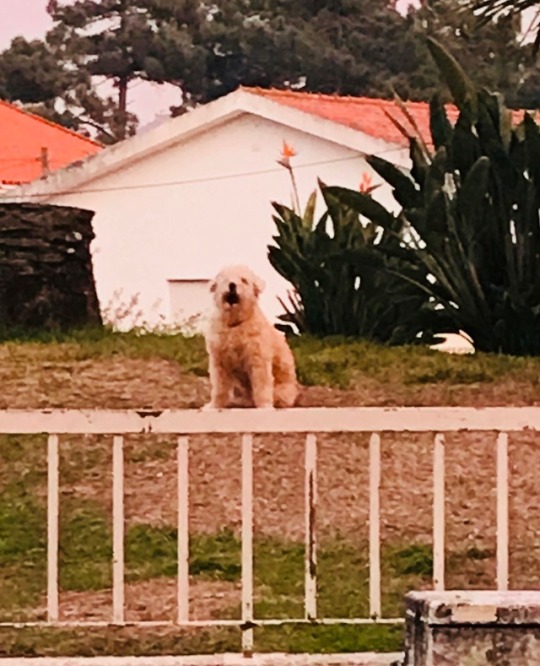
0 notes
Text
Living in Lisbon
An interview with Geraldo da Altonao, a Lisbon resident.
Well, I've lived here all my life really. And in this area too, the Bairro Alto. My street, the Rua de Rosa is one of the main streets, running down towards the river and towards the Baixa, which is the lower town. It's quite steep, well very steep for me now as I'm getting on. But that's Lisbon, full of hills.

When I was young nobody was bothered about coming here. Well Portugal was a bit of a European secret. It's always seemed quite run down and the travessas and ruas are as narrow as each other. In the old days I don't know how they got a horse and cart up some of them. If you didn't slip on the cobbles when it was raining you would surely slip on the horse shit, excuse me, and you had to watch out for that. There's cigarette butts between the cobbles and grass growing. But I think it's always been like that.
It would take a lot of money to do the place up. But then the tourists might complain. They seem to love the area and can't get enough of photographing the graffiti. What do you think of that? Tell me honestly. That's one thing we didn't used to have. It's every where now and it's just a mess. There's nothing they won't mark: windows, doors, street signs. Mostly it's criminal damage, no art in it and no message I can see. I saw one the other day: fuck you communist nazis. What's that supposed to mean? It could be a hangover from the Salazar days when he didn't like either.

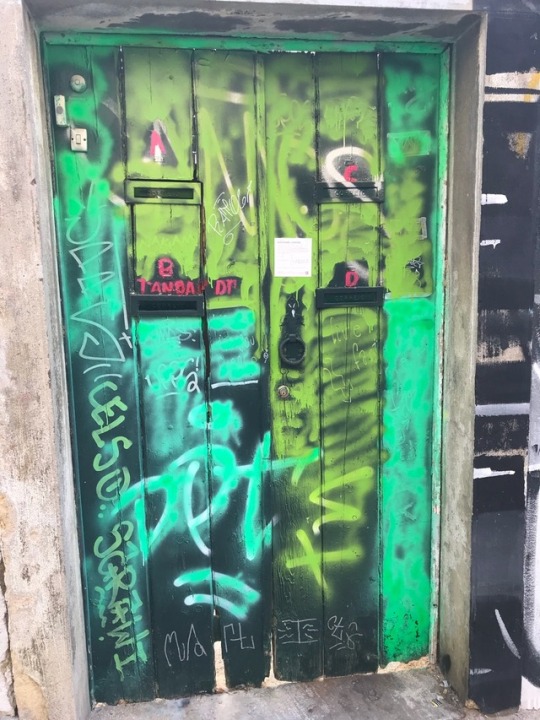
In the Botanic gardens, which you should visit they've graffitied the cactus. They've carved their names on the leaves with knives, foreigners, names like Jim and Nancy. So it's not all the local people making the damage. There's a statue in the Jardim da Estrela of a nude female where they've graffitied her breasts.


Mind you, they seem to leave the churches alone for the most part. I can't think it's out of reverence. And what do I care. Still it's a relief to see something spared. Well they did put some money into cleaning up the graffiti about ten years ago. But it didn't work did it.
I have to say I'm an old socialist. But I used to keep that to myself because of the PIDE/DGS. Salazar had it all sewn up for over forty years and although he brought a certain stability there were political opponents exiled to Cape Verde islands and they died there.
I used to be a teacher and I can't be doing with all this religious icon stuff. The glory of god is the glory of the hierarchy and calculated to make plebs like us gasp in awe when unveiled. And when you lived in a hovel why wouldn't you want to come to a church with all the pomp and ceremony and the best artists seized on by the kings and made to do the commissions that would elevate their patrons rather than poor Christ himself. That suited Salazar as well as he made a pact with the Catholic Church. Still he kept us out of World War Two. Well there you go. Don't get me started.
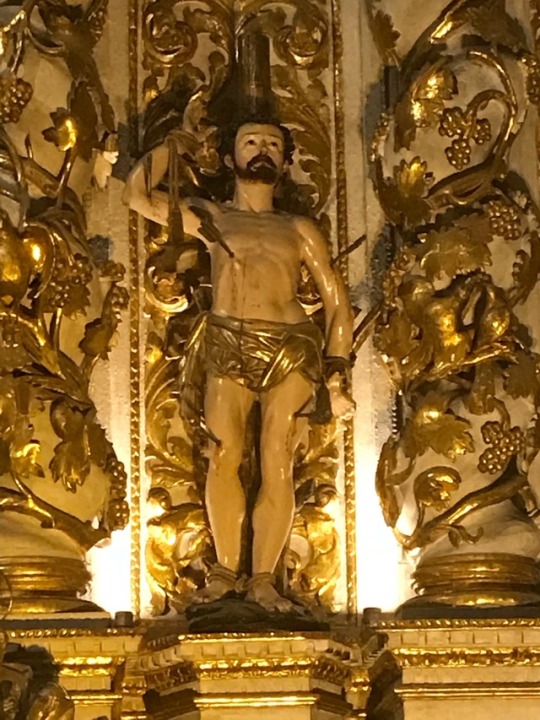
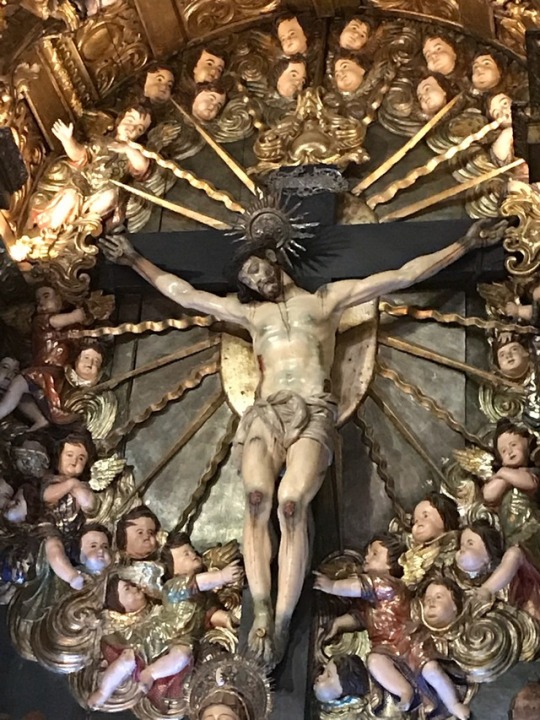
I didn't live in a hovel. My Dad was a local baker and he made the most glorious pasteis de nata. All the neighbourhood came to buy them. And at four o'clock in the morning he would sell them through a little hatch to passing workmen so he wouldn't get robbed. Later, the door of the shop would open and people queuing would buy bread and pastries. It was a busy time and I would help before going to school.
My Dad worked all his life at that and though he was an artisan with a special local reputation his heart was in the fado. You should have heard him sing on Sundays and I don't mean in church as he sang the old songs about the struggles against the monarchy, making a sideways reference to the estado novo.
My mother supported Salazar. She said she remembered bombs going off regularly at least once a week between 1920 and 1925 when she was a baby and toddler and listening to people talking about the shambles the republic was in. She and my father used to have big disagreements.
When the revolution came in 1974 he was one of the first to welcome it, a bit strange from a petty bourgeois baker I know. But he made a massive batch of bread and cakes and pasteis and gave them away for free. He didn't need to use a hatch then. He was well remembered for that and on the anniversary of the revolution he did the same thing. It became a local tradition.
The revolution made a difference. It allowed us to talk more openly and it finished the war with the colonies which was giving us a bad name in the world. It opened up the country and it ushered in some interesting ideas. Poets were pressed for new poems. European money came our way and we got the Vasco Da Gama bridge built. Now that's a feat of engineering.
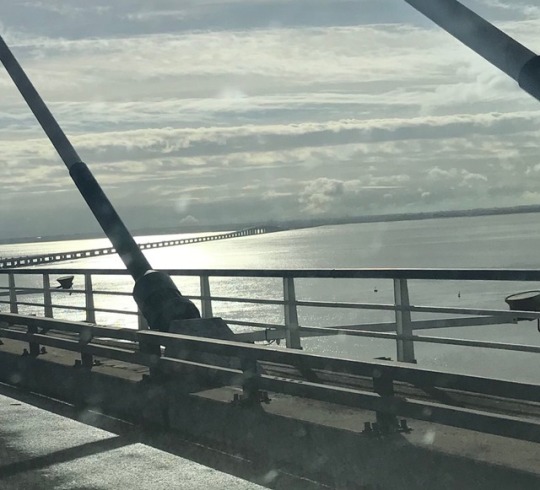
So here I am in the Barrio Alto over 70 years of age, having to struggle up and down the street to the supermarkets and the restaurant prices are outrageous, calculated to fleece the tourist and making it difficult to get about and eat out reasonably in your own road. Still we have our own places the tourists don't go. Like a lot of places things haven't been that great since the financial crisis hit. It doesn't stop tourists coming. That adds to the noise of people shouting at night. They tried to get the clubs to shut by two in the morning a few years ago but went back to later. The money in the tourist trade dictates everything.
Still I love Lisbon. It's more than the Bairro Alto. There are many Lisbons. Go over to the National Museum of Ancient Art. There are some great paintings and sculptures there, taken out of their religious context they have different meanings. And you won't see many tourists. Why? They're all queuing to get into the the castle of Sao Jorge. There is a lot more to Lisbon than what the tourists see coming off the cruise ships that dominate the river front.
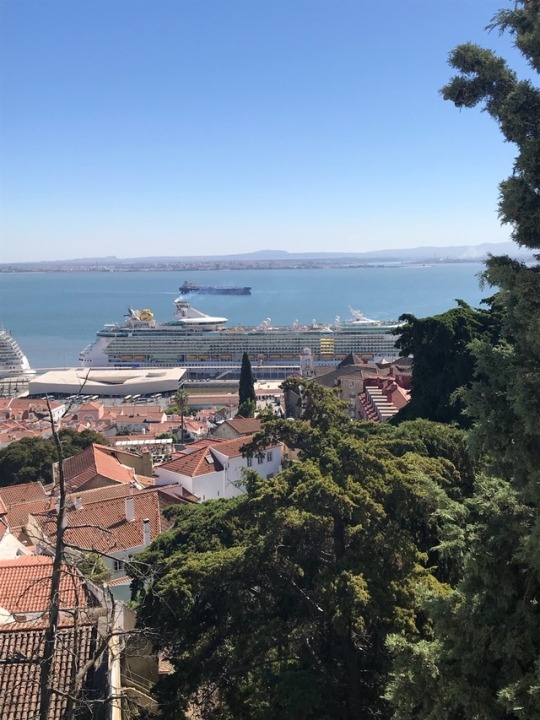
0 notes
Text
The Walls Of Óbidos
The walls of Óbidos.
We had 50 miles or so to cover to get to Lisbon and all day to do it. So we decided to take the National route as the motorways in Portugal seem pretty expensive, compared to other places. As we progressed down the N8 road, which parallels the motorway, it became clear that if you want to travel fast in Portugal there is no substitute for the freeway, unlike France for example which has a lot of D roads going straight as an arrow.
It suited us though as the N8 goes past Óbidos which proved to be a worthwhile stop.
This town has high vertigo inducing walls all the way round, and you can walk them if minded. While it’s an attractive idea, most people are put off by the steep climb to get onto the walls, and once there by the prospect of walking an unevenly cobbled path less than four feet wide, with a sheer drop between thirty and forty feet straight off the edge with no barrier preventing that occurring.
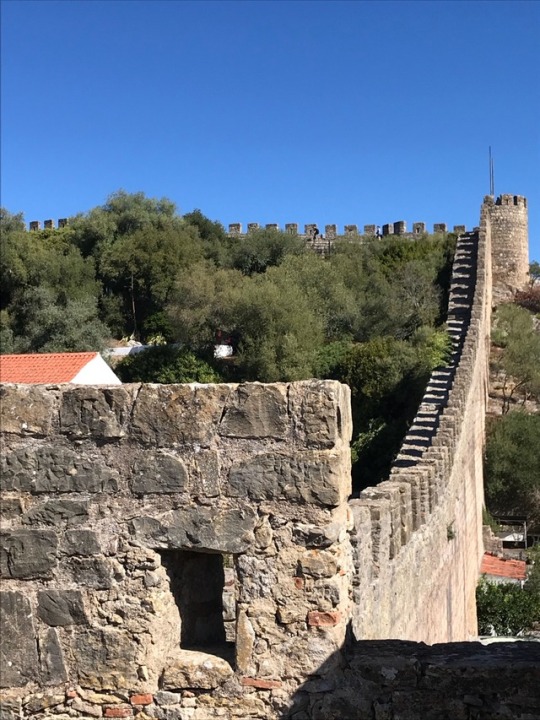
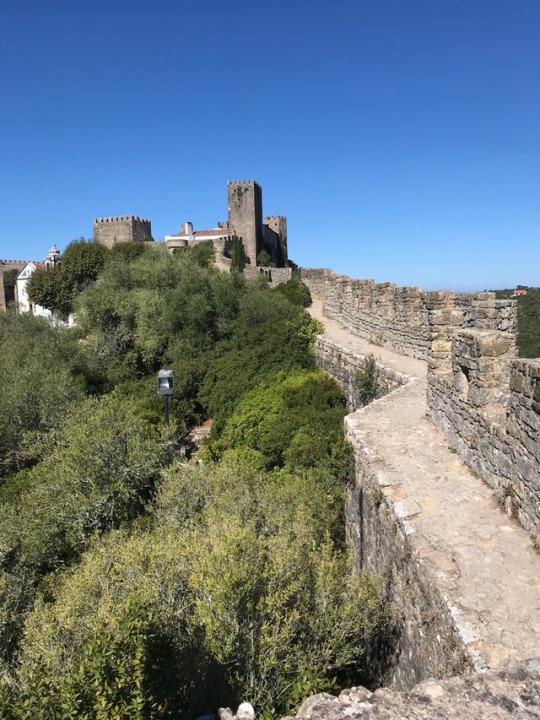
I was all for it particularly to get away from the hordes of tourists pouring into Óbidos this beautiful Sunday morning. For the town attracts folk from far and wide. It’s a wonder it can hold them all.
We drove right up to the town under the low slung arches of the outer town wall and onto the white dust of a massive car park. It was the first indication that the ambience of the place is changed to cater for the needs of the people wanting to see it, and in the process what they want to see is lost. It’s the same everywhere, particularly these days when so many seem to want and get to be somewhere else worth being. The slow stream of tourists being funnelled through the narrow entrance at the walls almost became a queue. I half expected to come across a turnstile.
Once inside, the contrast of shadow and light was acute, with the walls casting dark blocks withholding the azure sky and preventing the sun’s penetration; while in the upper sections of the town, freed from the walls constrictions, light bounced blindingly off the white buildings. You could see all this more clearly as you gained height in the climb up the steep stairway to the battlements.
Once on top the reward for the effort was immediate. The wall encircled and enclosed the town, offering numerous vantages as it followed the contours of the hill it had been attached to. At intervals there are mustering points which have enough room to hold only a few people and would have been used by the town guard to repel the enemy, and to allow each other to pass in opposite directions.
And as we progressed we met people coming the other way intent on hugging the battlement wall. Madeleine, who was bravely making her own way with one hand balanced on the stonework that acted like the shoulder of a reassuring friend, encountered a sweating elderly man coming towards her intent on watching where his feet were going and elbowing the battlement as if he could push it out the way. She recognised a fellow height fearer. She stopped and gave way and he made his way round her as if on a ledge.
My own inclination was to step out of the way to let people pass, and as I drew closer to the abyss, wonder that it would only take a psychopath or a joker with a bad sense of humour to give me a nudge and send me tumbling onto the tourists below. But you have to trust. We do it every day when we walk out our doors, maintain the hope that people will be reasonable enough that we get home again in one piece. Some don’t make it and on the town walls of Óbidos that thought occurred to me.
It didn’t stop me fooling around and getting Madeleine to take a photo of me reaching out as if to pluck a lime from the upper branches of a tree growing on the inside of the wall in someone’s garden. After she got over her gasp and berating me for my fool hardiness she obliged. But it wasn’t that big a risk: it just looked it to her.
So in that way we got round the wall and Madeleine was relieved and me disappointed that a barrier had been placed on it that prevented a full circuit so we had to come down.
All that made us hungry and we looked for a suitable place to eat. The restaurants and cafes pushed out into the narrow streets making passage difficult were crowded with midday eaters.
We went down a quiet side alley and found a small entrance to a cafe with even smaller rooms. The first room was on an incline with steps leading up to tables and had a massive arched beam jutting from the lower part of one wall out across the room to join the upper part of the opposite wall. This meant that at table you would have to talk over or round the beam to your neighbour, heads bobbing up and down.
We passed that and went into a smaller room and sat at a table next to an old fashioned still that had been used for the manufacture of the local Óbidos cherry brandy. A display of bottles showed what was for sale.
So we ate a snack there and left walking back down through the town. Really I wanted to get away now as the numbers of people mildly disturbed me.
I suppose my misgivings were based on the crass symbiosis that exists between visitor and resident. This seemed illustrated by an observation on passing a church with an open door within which Sunday Mass was in progress. As the priest reached the the most sacred part of the ritual, the offering up of the body, blood, soul and divinity of Our Lord Jesus Christ, people were wandering into the entrance walking their dogs and taking photographs. From a devout congregation point of view it would have looked like ogling profanity.
We left Óbidos soon after and in a while took the motorway as the journey was now seeming interminable despite the short distance to Lisbon. This seemed to underline the slowness of the old in comparison with the speediness of the new and how sleepy old Óbidos has been overlaid by another somnolence which is induced by a kind of wandering, uncertain of what it is seeing. At least the prospect of the town walls offset that with the adrenalin they induced.
0 notes